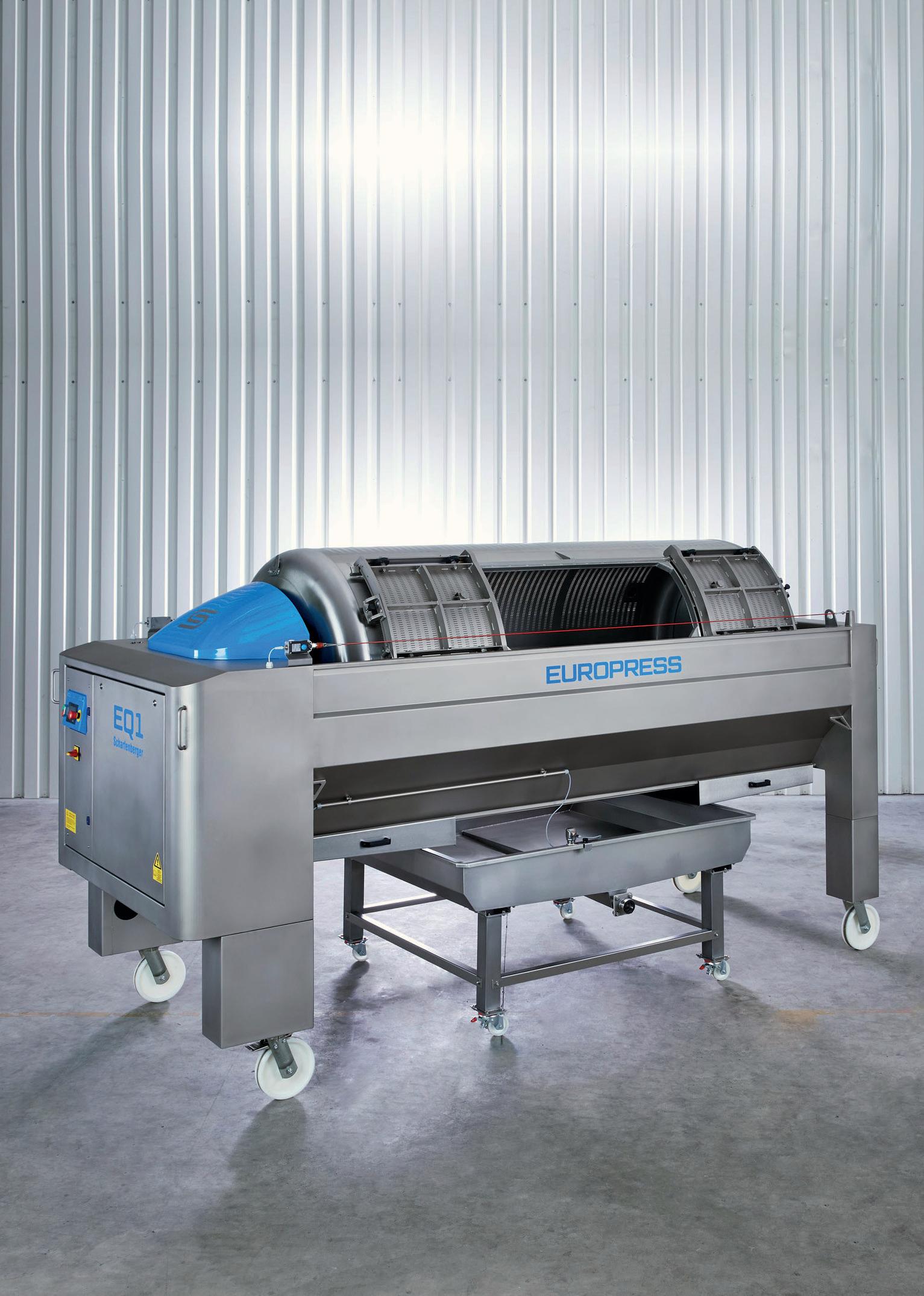
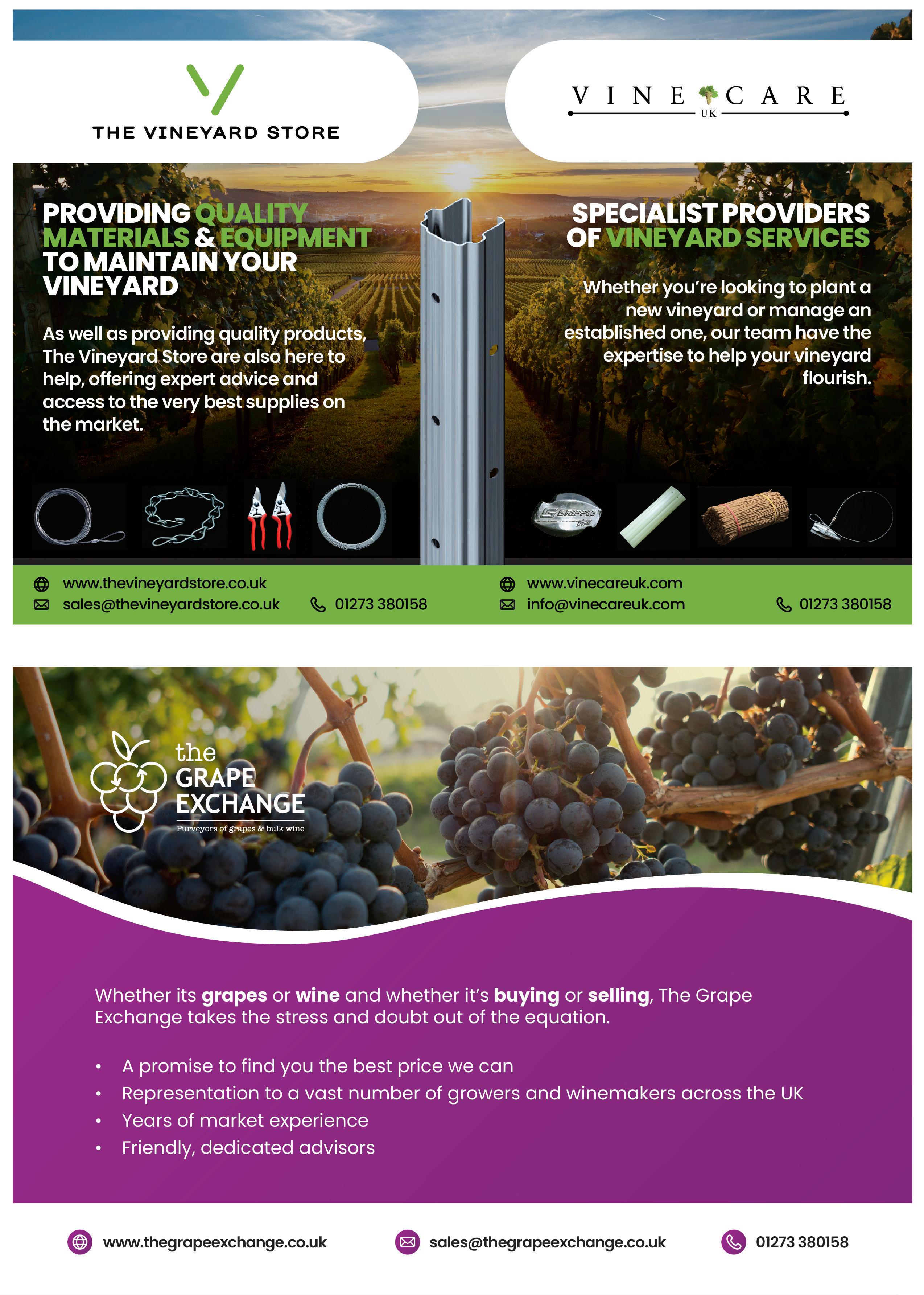
Preferred partner:






Preferred partner:



www.vineyardmagazine.co.uk

VINEYARD
Kelsey Media, The Granary, Downs Court
Yalding Hill, Yalding, Maidstone, Kent, ME18 6AL 01959 541444
EDITORIAL
Editor: Rebecca Farmer vineyard.ed@kelsey.co.uk
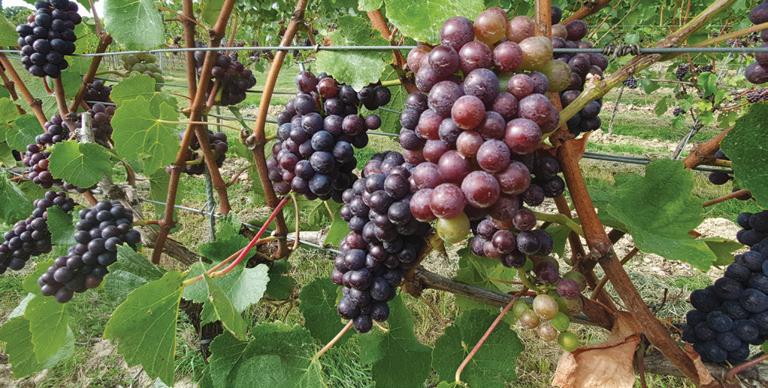

GRAPHIC DESIGN
Jo Legg
Flair Creative Design jo.legg@flair-design.co.uk
ADVERTISING & MARKETING
Jamie McGrorty 01303 233883 jamie.mcgrorty@kelsey.co.uk
PHOTOGRAPHER
Martin Apps www.countrywidephotographic.co.uk
MANAGEMENT
DIVISIONAL MANAGING DIRECTOR: Steve Kendall
PUBLISHER: Jamie McGrorty
RETAIL DIRECTOR: Steve Brown
SUBSCRIPTION MARKETING MANAGER:
Claire Aspinall
PRINT PRODUCTION MANAGER: Kelly Orriss
DISTRIBUTION

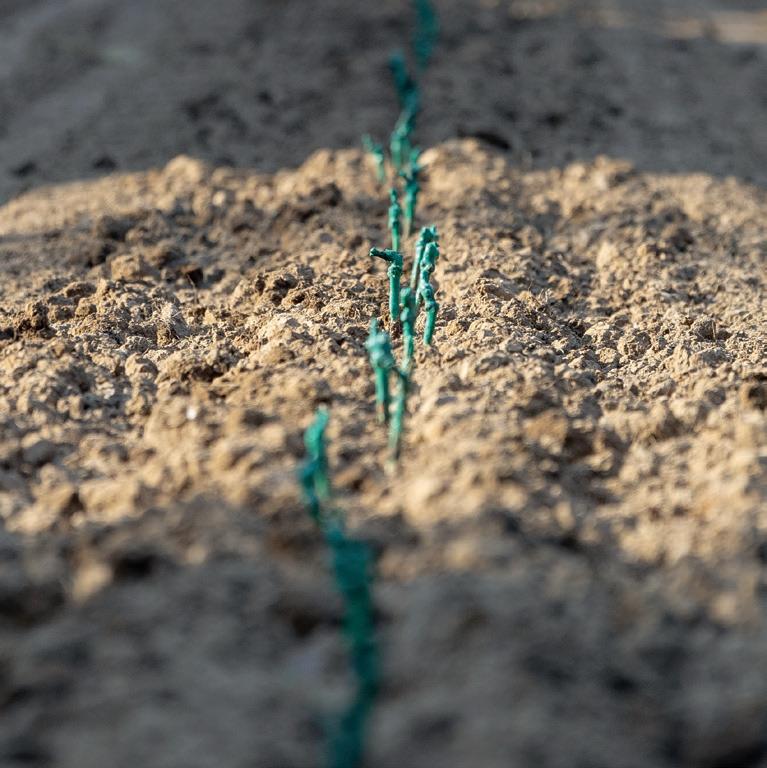
Distribution in Great Britain: Seymour Distribution Limited
2 East Poultry Avenue, London EC1A 9PT Tel: 020 7429 4000 www.seymour.co.uk
Distribution in Northern Ireland and the Republic of Ireland:
Newspread
Tel: +353 23 886 3850
Kelsey Media 2023 © all rights reserved. Kelsey Media is a trading name of Kelsey Publishing Ltd. Reproduction in whole or in part is forbidden except with permission in writing from the publishers. Note to contributors: articles submitted for consideration by the editor must be the original work of the author and not previously published. Where photographs are included, which are not the property of the contributor, permission to reproduce them must have been obtained from the owner of the copyright. The editor cannot guarantee a personal response to all letters and emails received. The views expressed in the magazine are not necessarily those of the Editor or the Publisher. Kelsey Publishing Ltd accepts no liability for products and services offered by third parties.
Kelsey Media takes your personal data very seriously. For more information of our privacy policy, please visit Kelsey Media takes your personal data very seriously. For more information of our privacy policy, please visit https://www.kelsey.co.uk/privacy-policy/ . If at any point you have any queries regarding Kelsey’s data policy you can email our Data Protection Officer at dpo@kelsey.co.uk.
In conversation... Marasby is a specialist online platform dedicated to quality UK grown wines and produce.

Research has identified the Crouch Valley as having ideal conditions for viticulture. When New Hall Vineyard planted the first vines in 1969 they certainly knew their land.

Vineyard finds out how vineyards can find their own perfect balance. How can yield be optimised without compromising on the taste of the finished product? What factors are prompting those decisions in 2023?




A breakthrough frostprotection product described as “an absolute gamechanger” for English wines is set to be released in the new year and will be distributed in the UK by Vinecare UK.






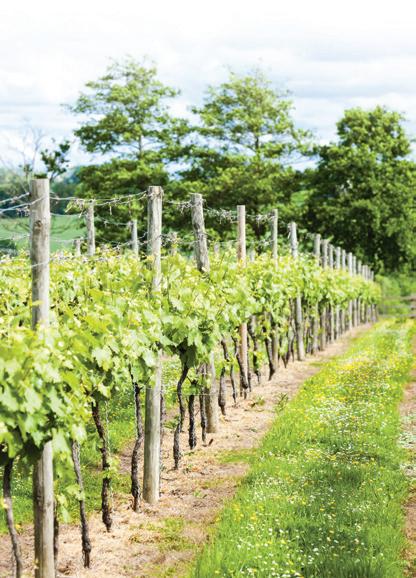

Backed by an unrivalled range of services
• Vineyard site selection
• Soil health strategy

• Omnia and TerraMap soil scanning
• Farm business consultancy
• Agrochemical input supply
• Biological and sundry products
• Environmental Stewardship advice
• Specialist packaging division
Talk
Your local depots:
HUTCHINSONS
Canterbury: (01227) 830064
PRODUCE PACKAGING
In a restaurant recently I had the misfortune to be sitting near another diner who was a serial complainer. Having ordered a main course (after a lengthy discussion) the customer then proceeded to ask for it to be cooked in the most inappropriate manner and then on receiving the main meal and finding it tough the customer proceeded to complain yet again.
The extreme patience of the serving staff as they dealt with this client got me thinking. This month I have been told that a rosé that is dark rose in colour is difficult to sell to the end consumer. This is interesting since, like the diner in the restaurant, many consumers have no idea what they are ordering. They have rejected out of hand what turns out to be an excellent rosé based solely on the colour in the bottle. Up until the wine is poured and tasted any judgement lacks validity. Not everyone will like every wine but every wine should be considered on its own merit, not dismissed.
There were also several discussions this month about the consumer being hesitant to try new varieties that they had not heard of. Does this make the customer right? As climate change comes sharply into focus and reports continue that temperature records are being reached all over the globe from Arizona to Zografou, consumers are facing the reality that as the planet warms they may have to adapt. As temperatures rise growers will be forced to look at the vines they plant, potentially moving away from traditional varieties that are becoming unsuitable for a regions changing climate.
Inevitably, responsible consumers will start to look at sustainability credentials for the products they purchase and here there will be a requirement to embrace the new. New varieties are just the beginning of the new customer experience so it is good to get ahead of the curve and start the education programme now. This month Vineyard was invited to a PIWI tasting (page 50) and it was great to see UK releases of Sauvignac and Caberet Noir wines that offer the ability to reduce inputs and thereby mitigate the impact on the wider environment whilst at the same time offering excellent quality wines with new flavour profiles for an ever demanding public.
Weasenham Lane • Wisbech
Cambridgeshire PE13 2RN
Tel: 01945 461177
e: information@hlhltd.co.uk
www.hlhltd.co.uk
21650HUT~advert_for_Vineyard_Magazine(93x270)no_flash.indd 1 11/04/2023 12:55 AUGUST 2023 | VINEYARD
With patience and time it is possible to get to a point where people are open minded before they make a judgement. Something that is new should be a joy to experience not shied away from because it is too pink or unfamiliar. Human beings have a great capacity to learn but they need to be presented with the possibilities. The UK wine industry with its youth and enthusiasm is in a great position to make that presentation.


One the UK’s largest direct-to-consumer online wine retailers, Virgin Wines, has become a member of the Sustainable Wine Roundtable (SWR).
SWR is the only global collaborative platform to advance sustainability across the wine industry from production to retail. Virgin Wines is pleased to be joining its peers at the roundtable and working towards the collective goal of advancing sustainable

impact through best practice sharing and collaborative initiatives.
CEO Jay Wright said: “Becoming part of the Sustainable Wine Roundtable is an important step for us as we continue to develop our long-term strategy in terms of sustainability. We want to do what’s best for the industry as a whole, and we’re proud to be joining a group that are collaboratively working towards that shared goal.”
BevTech Ltd are delighted to announce the appointment of Mike Downing as Technical Sales Manager to their expanding team.
Mike holds a diploma in Mechanical Engineering from Guildford College of Technology and brings a wealth of experience from his 20 years in the South African wine industry. He is a specialist in GAI bottling and labelling equipment. As well as an engineering background Mike has first-hand experience of running bottling lines for all sizes of producers, essential for understanding the issues and challenges faced. His expertise also covers a wide range of wine production equipment, including

presses and crusher destemmers. Mike is based near Bristol, so is well placed to support wineries across all regions.
David Cowderoy, MD and winemaker commented: “We are delighted to welcome Mike to our team. We are very fortunate to have his extensive experience, engineering skills and professionalism to further support our clients with their production.”
Mike Downing commented: “I have seen the UK wine industry go from strength to strength and I am thrilled to be part of this exciting sector. BevTech is partnered with many of the best equipment suppliers to the beverage industry, including GAI, who have an outstanding reputation world-wide.
Tom Owtram, General Manager of the SWR commented: "We are delighted to welcome Virgin Wines to our global membership of more than 90 members. The SWR brings together leading wine companies from across the value chain to collaborate and drive collective action and knowledge sharing. It's an exciting time to join the organisation as we look to grow our impact at scale".
I am pleased to be joining the expert team at BevTech and look forward to working with producers across the country.”


















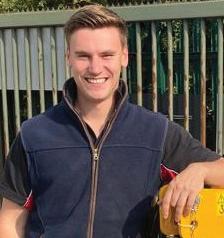
Vinescapes has launched the industry’s first ever Graduate Training Programme of its kind and is delighted to announce the appointment of Sarah Stott as the first graduate trainee.
The graduate trainee programme is a structured two-year scheme providing training and experience across all aspects of Vinescapes’ vineyard and wine production business delivery, vineyard modelling and establishment, winemaking (in the UK and overseas), research and data analysis, and both technical and strategic consultancy service provision.
The programme provides a much-needed opportunity for skilled and ambitious individuals from all over the world to work and learn from some of the most knowledgeable people in their fields.
Sarah holds a BSc in Viticulture & Oenology from Plumpton College and since graduating in 2022 has already gained vineyard and winery experience in the USA, UK and South Africa.

Dr Alistair Nesbitt, Vinescapes CEO commented: “There is exceptional ambition and skill amongst many new Viticulture & Oenology graduates around the world and this programme provides a fantastic opportunity to harness and nurture those talents. We want to attract the world’s best graduates to our business and support rapid career development through a mix of training, mentoring and exposure to a range of projects with some of the worlds’ top viticulturists, winemakers and production businesses. We are really delighted to welcome Sarah to the team as our first Graduate Trainee.”
Sarah commented: “The graduate scheme is so much more than a training programme with loads of opportunities to learn the many different aspects of the industry as I develop
StottThe details of the scheme and Sarah’s blog can be found on the Vinescapes website www.vinescapes.com/graduate-scheme or contact graduate@vinescapes.com
my career. I have already had some remarkable highlights that have enriched my experience. I have been involved in addressing winery wastewater management to optimise and harness the value of wastewater sustainably. Another high point has been engaging in decision-making for planting new vineyardsfrom variety and clone selection to rootstock choices - every step is carefully considered in
relation to site location and soil types. I am eager to make meaningful contributions to Vinescapes and the wine industry as a whole. It’s great that I can study for professional qualifications as well as gain experience.”
Vinescapes are looking to appoint further graduates to the scheme and have circulated details to educational institutions internationally.
“London Cru’s founder, Cliff Roberson, is pleased to announce the acquisition of Foxhole Vineyard in West Sussex, bordering the Bolney Estate. The 20,000 vines are primarily made up of Pinot Noir and Pinot Gris with a small pocket of Bacchus. This acquisition will guarantee our supply of grapes for future vintages and also allow quality control of the fruit.
London Cru Winemaker Alex Hurley said: “Differing from most of the producers in the UK, London Cru has a focus on crafting top quality still wines. Whilst many vineyards are being planted around the UK,
few growers truly have this still wine focus. Foxhole Vineyard marks London Cru’s ambitious project to increase the quality and styles of still wines being made in the UK by taking advantage of controlling every stage of production with this purpose.
"Less than 50 miles from the urban winery Foxhole Vineyard demonstrates London Cru’s dedication to pushing the boundaries of winemaking and elevating the quality of still wines in the UK. We are very excited to start this next chapter that embodies the spirit of London Cru’s innovation.”
Maximilian Riedel and the Riedel UK team visited wineries in Hampshire, Kent and Sussex and conducted wine glass development workshops with twentyfive of the foremost wine producers from these regions.
The quest was to discover the perfect Riedel glass to show English Sparkling Wine at its best in each region and, if possible, to realise a Riedel glass which would successfully showcase all English Sparkling Wines across these regions.
Hosted by Exton Park in Hampshire, Squerryes Estate in Kent and Ridgeview Wine Estate in Sussex, a panel of winemakers and expert tasters, led by Maximilian Riedel, tasted from a shortlist of twelve different Riedel glasses, with a large number of different English Sparkling Wines from each region. All wines were tasted blind, and the process eliminated, in stages, those glasses which failed to show the best expression of the wines – and then focused, in fine detail, on those glasses which revealed the best elements of the wines both on the palate and on the nose.
Each workshop was conducted independently, and so it was especially
pleasing that a unanimous decision was reached across all three panels, with the exact same Riedel glass being selected as the best, at each session. The winning glass was based on the Riesling shape in the Riedel Veloce range.
This glass will now see some adaptations – namely, a nucleation point will be added to the glass to improve the way in which the glass manages the mousse, and the text ‘English Sparkling’ will be added to the base before the glass is launched to the market in a few months time.
Speaking after the event, Maximilian Riedel said “I have long admired English Sparkling Wines, since I made my first vineyard visits here almost ten years ago. In that time, I have seen the industry grow and the wine develop to a truly internationally high standard, so that it is amongst the very best sparkling wines in the world. I am proud to support English Sparkling Wines with a specific Riedel glass, which shows the fruit, the freshness,
and the complexity of these great wines at its very best” He went on to say: “It is especially pleasing and forward thinking that, in selecting a Riedel Veloce glass, the panel recognised a glass which is brand new, state of the art glassmaking technology, where we are able to produce, by machine, a wine glass which is as fine and as light and as balanced as a hand-made glass and, as such, is world leading in its field”.
Simon Thorpe MW said: “We are absolutely delighted that Maximilian Riedel has chosen to create a bespoke English Sparkling Wine glass. The selection process was fascinating and very robust, and the chosen glass is a wonderful outcome. Certainly, the glass showcased the full quality and complexity of the wines, both on the nose and palate. To have an English Sparkling Wine glass of such quality created especially for our wines is a real marker of the development of the industry and its growing reputation both on the domestic and international marketplace”.

UK wealth managers see demand for fine wine comfortably outstripping other passion assets, such as watches, luxury handbags, and art, new research from fine wine investment platform WineCap1 shows.
The study – conducted among 50 UK-based wealth managers and financial advisers who only deal with high-net worth clients (£100K+) – revealed that fine wine will attract most demand from investors over the coming year amongst all leading passion assets, with 96% expecting demand to increase, of which three out of five (60%) said that it will increase “significantly”.
This placed fine wine comfortably ahead of watches (86%) and luxury handbags (80%) in second and third place respectively. Other well-established passion assets such as art (68%) and classic cars (62%) placed much lower in sixth and tenth place.
The report, Fine Wine: The Journey from Passion Asset to Mainstream Asset Class, found that fine wine is already featuring prominently in many wealth managers’ client
portfolios. UK wealth managers and advisers estimated that over 40% of their high-networth (“HNW”) client base invest in fine wine with an average portfolio allocation of around 10%.
Fine wine’s growing prevalence among HNW client portfolios provides compelling evidence, if any is needed, that it has graduated to a genuine alternative asset, a highly effective portfolio diversifier, operating alongside other popular alternatives such as hedge funds, real assets, and private capital as well as mainstream assets such as fixed income and equities.
In common with other alternative assets, fine wine tends to feature more prominently in larger portfolios belonging to more sophisticated investors where there is a greater premium on diversification. Almost all respondents (98%) said that clients investing in fine wine are mainly experienced investors, with 62% saying they were “very experienced”.
Alexander Westgarth, CEO at WineCap said: “Fine wine has long been seen as
a ‘passion asset’ – a fun and exciting yet niche investment option for connoisseurs and hobbyists. But over the past few years, characterised by increased market and economic volatility that have destabilised traditional assets such as equities and bonds, perceptions of fine wine have evolved from a passion asset into a mainstream alternative asset.
“The fact that fine wine has received such a positive reception from wealth managers, whose success relies on advising clients on making the right investment decisions, is a testament to its growing appeal.”
As the investment climate becomes even more challenging, squeezing returns from traditional assets, fine wine’s appeal as an effective portfolio diversifier will continue to grow. The sector has also further professionalised and more wealth managers are seeking partnerships with specialist wine investment firms such as WineCap to ensure their clients can gain access to a similarly highquality service with full price transparency. Read the full report on WineCap’s website.
1 WineCap commissioned independent research firm PureProfile in April 2023 to survey 100 wealth managers, independent financial advisers and financial intermediaries in both the UK and US on views and sentiments towards fine wine (split 50 per market). In the UK, 35 of the respondents classed themselves as wealth managers, eight as independent financial advisers and seven as financial intermediaries/advisers.
A £300,000 fund to provide support for food and drink festivals and events across Wales has opened.
The small grant scheme, which will address the 10 key actions of the Welsh Government’s ‘Vision for the Food & Drink Industry’, will support festivals and events to add value to the industry in Wales and aims to improve visitor access to and awareness of Welsh food and drink. It also aims to encourage collaboration and co-operation between Welsh hospitality and food and drink businesses to source more local food and drink, and to increase the prevalence of Welsh food and drink on menus and retail offering.
The scheme is open to festivals and events taking place between the 1 July 2023 and 31 March 2024. It brings together the areas of agri-food, food processing, tourism destinations, the food service sector, food festivals and food retail outlets into one scheme.
Minister for Rural Affairs and North Wales Lesley Griffiths said: “This small grant scheme will provide support for food festivals and events which have innovative ideas on the promotion of Welsh food and drink.

“Welsh food and drink is going from strength to strength, with a number of exciting and high-quality products available. I’m pleased to
be able to announce this small grants scheme is now open, to support festivals and events in spreading the word about the excellent quality of food and drink we have here in Wales.
“It will capitalise on the economic benefits of providing visitors with a unique, high quality and distinctive cultural experience, building networks and educating businesses.”
Full details about the scheme including eligibility and how to apply is available at:
https://businesswales.gov.wales/foodanddrink/growing-your-business/food-tourism-and-culture

Following the announcement by DEFRA and the APHA that Colorado Potato Beetle has been found on sites in both Hampshire and Kent, Vineyard magazine was informed of another potential invasive species. The spotted laternfly has not yet arrived in the UK but since vines are particularly vulnerable to this pest vineyard owners and managers are being made aware of what to look out for.
It is not yet known if it will survive in the UK climate but due to climate change it is possible conditions will become more favourable. As with all invasive species early detection is crucial so that it can be eradicated as quickly as possible before sizeable populations become established.
The DEFRA Pest Alert contains the following facts about spotted lanternfly:

◆ In 2014, the first finding of Lycorma delicatula (spotted lanternfly) in the US was confirmed in the state of Pennsylvania. Originally from China, this bug has had a significant impact on the vineyard industry in South Korea and the United States over the past few years. In the US, the damage is mainly seen on vineyards with large populations affecting fruit setting the following year.
◆ Spotted lanternfly prefers Ailanthus altissima (tree of heaven) as a host but can live on almost any tree. There are four instars (stages) before


Lycorma delicatula turns into its adult form. The first three instars are black and white colouring and the fourth is red, black and white. Adults have a pinky-grey wing cover with black spots. All stages feed on plants and trees and produce a sugary honeydew which, when it falls, can cause sooty mould growth.
◆ Tree of heaven is planted as an amenity tree but is also an invasive weed in the UK, originally brought over from China but has now spread and is commonly seen growing in scrubland (e.g. along railway tracks) in the south of England. Tree of heaven is on the prohibited list of invasive plants (listed in 2019) and is prohibited from growing on, transporting or selling. It can be distinguished by its smell (like rancid peanut butter) and smooth leaf margins.
◆ Spotted lanternfly is very good at hitchhiking by laying eggs on any object. The egg masses are a dull grey/brown colour and look like a smudge of mud. The eggs which can be laid on plants or any object, are believed to have been originally introduced to North America on stone slabs and they have been spread in the US by vehicles among other things.
If you suspect the presence of the pest, please inform the relevant authority immediately.
A code of practice designed to support the safer use of tools that can help farmers operate more sustainably, address labour shortages and respond to global demand for more intensive crop management has been published by BSI.
The guidance on autonomous mobile machinery (AMM), including crop robots in agriculture and horticulture, has been developed to enable farmers, horticulturists, government agencies, autonomous mobile machinery manufacturers, importers and distributors and other users to take advantage of available technology. Since the World Resources Institute estimates that farmers will need to produce around 60% more food by 2050 to serve the world’s growing population, having access to these tools could be crucial to help them improve sustainable food production and meet rising demand.
Use of autonomous mobile machinery in agriculture and horticulture – Code of practice (BS 8646:2023) provides guidance around the safety and risk management processes that can be applied to farming operations, information on instructions and training for safe operation and maintenance of AMM and advice on farm planning, including hazard controls and emergency preparedness.


This follows a global drive towards uptake of AMM in agriculture and horticulture to support labour shortages and a need for more intensive crop management. In February this year, the UK Government pledged £168m in funding to help encourage the development of new technology and innovative ways of farming, with a focus on practical solutions that advance food productivity and deliver significant environmental and animal welfare benefits, including robotic technology.
Despite the benefits, use of AMM can also present risks, especially when integrated with staffed farm operations. This new standard provides best practice guidance on their introduction and safer use, whilst encouraging wider adoption of AMM, particularly in smaller enterprises.


As set out in BSI’s recent white paper on Smart Farming, with agriculture contributing an estimated 19-21% of global carbon

emissions, technology can address many pressing challenges. For example, data analytics solutions, such as sensing the moisture level of soil, could increase crop precision and accuracy, while robotics technology is already being used to take on tasks like fruit picking.
Sebastiaan Van Dort, Associate Director, Sustainability & Energy at BSI said: “Smart farming can bring huge benefits to society, including more economic production of crops, sustainable production and greater food security, as well as helping the agriculture sector to meet Net Zero targets. However, owners and operators of AMM also need to feel sure that the introduced technology is used safely.”
BS 8646:2023 also clarifies roles and responsibilities of owners and operators, designers and manufacturers and importers and distributors to reduce uncertainties.


The Provence-Alpes-Côte d’Azur region is famed for many things including the agricultural products such as the Lavender fields of the Valensole Plateau and the black truffle markets that take place each year in the town of Riez from November to March not to mention almonds and of course vineyards. In the heart of the Provence region close to the Parc Naturel Régional du Verdon in the village of Villecroze sits a very special vineyard, Chateau Thuerry.

The site covers over 300 hectares with 40




hectares under vine and has achieved organic certification but Chateau Thuerry literally has hidden depths. Dating from the time of the Knights Templar the original Chateau building greets visitors as they arrive. The vineyard has revealed many ancient artefacts since it was first planted in 1927 and these are housed in a case in the main tasting room. Visitors then leave this history behind and are invited to tour the winery which was built in 2000. The entrance to the winery feels like a secret bunker and the concrete steps lead three metres underground to the tank room. The

tanks and barriques are arranged in a circle around a central hole in the roof. On the surface there is a large concrete area with a small hatch in the middle. Sorting tables are laid ready at harvest and the selected fruit is then delivered to the hatch and travels down a funnel directly into the selected vessel. To switch receptacle the funnel is simply moved to the next tank and so on through harvest.
The Gorges of Verdon carved by the Verdon river offer sanctuary to many birds of prey including Griffon vultures and black vultures that were reintroduced to the area in 1999.
This small hatch is the only sign of what lies three metres below the surface
These massive birds are often seen soaring above the towns and villages near to the deepest canyon in France and it is perhaps no surprise that when I ask about the predators in the vineyard that our guide informs us that unlike many of the English and Welsh Vineyards we visit, there are not really any losses to birds! However, one predator that is highly problematic for the vineyard is the wild boar. Although ‘sanglier’ is found in every charcuterie and on many menus across the region the vineyard still has to accept a significant amount of loss to these large creatures that really enjoy feasting on the grapes (males are estimated to weigh in around 100kg or more if particularly well fed).
In the maritime climate harvest is undertaken at 3am for optimum fruit quality and flavour. Some of this harvesting is done by machine but certain varieties are picked by hand. Supplying wines to award winning multi-Michelin starred restaurants the wines exquisitely represent the different aspects of the region marrying the old and the new perfectly and offering something for every palate.
There are three appellations at Chateau Thuerry: AOC Côteaux Varois en Provence, AOC Côtes de Provence, IGP Var Côteaux du Verdon. The wines produced at Chateau Thuerry are split between 45% red, 45% rose and 10% white. There are many styles of wine made here including a syrah/grenache blend made by utilising indigenous yeast and a rosé blend of 20% Merlot and 80% Caladoc that is both vinified and aged in oak – this wine is certainly a rosé to be taken seriously and would be able to travel the length of a meal without fatigue. Their premium wine L’Exception2, offered at 95 euros, is a blend of Merlot and Cabernet Sauvignon described as “an intense wine that will captivate you with its personality and power.” This description is a great summation for the whole winery experience and visitors to the region are welcome to visit the winery and enjoy this unique experience themselves.




The


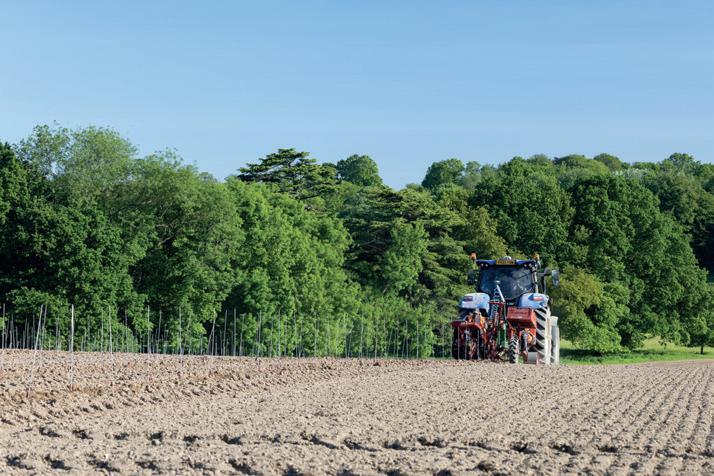
The village of Newick, Sussex is now home to Newick Wine Estate. Jonathan and Charlotte Sharpe have lived in the Village for 16 years and have taken the decision to plant 20 acres of their most suitable land with Pinot Noir, Pinot Meunier, Chardonnay and Bacchus vines. In total there were 37,000 vines planted across four days in May by a team from viticultural specialists VineWorks.
Preparation started two years ago when VineWorks undertook site analysis and took soil samples. The site was chosen because it was not at the bottom of a slope where cold


air may collect and cause frost pressure. The location was also carefully selected because Jonathan and Charlotte wanted to be able preserve the well established trees on the estate.
The original plan had been to plant the vines in July 2021 but Jonathan and Charlotte decided to wait a year while they completed a viticulture course at Plumpton College. The couple also took advice from VineWorks and developed a business plan which will include the growing of fruit for other producers. Although some of the grapes will be grown under contract there will also be


wine produced under the Newick Wine Estate Label. “We are right on the edge of the village with a footpath through the vines,” explained Jonathan. This has allowed people to really see what is happening and how the land is developing. “We really want to maintain our connection with the local surroundings,” Jonathan added.
As the vines mature the Newick Wine Estate will be a lovely connection to the villages past as a soft fruit growing region. In time Jonathan and Charlotte hope the local community can walk into one of the local pubs and enjoy a local wine.









What is Marasby and how did it begin?
England and Wales contain the most exciting cool-climate wine regions in the world, yet 99% of the wine we drink in the UK is still imported. Talya Roberson and I founded Marasby as our way of helping to grow the 1%.

Before Marasby, Talya and I worked together as Commercial Director and Managing Director at an importer known for its American wine specialism – under our tenure, it won USA importer of the year seven years running. We wanted to take everything we learnt building this specialism and apply it to building the profile of our own amazing, emerging, homegrown industry.
A quick note on the name ‘Marasby’ – it’s named after Talya’s three daughters: Margot, Astrid, and Blythe.
What is the ethos of Marasby?
The ethos is encapsulated in Marasby Market, which will be a specialist, curated marketplace for the UK wine industry, launching in September. It has been built to showcase the full diversity of high-quality wines now being produced here, making it easy for consumers to discover and buy English and Welsh wines direct from the producer, while empowering those producers to control their own brands and messaging. It's a collaborative approach that takes the view that we could all fight it out to grab our individual share of the 1%, but we are better off working together to grow into the 99%.
What do you find most exciting about English Wine?

The amazing diversity! The UK is the historic centre of much of the world’s wine trade, and as a result, our country’s drinkers are used to enjoying a huge variety of wine styles, grapes and flavours. That’s not likely to change any more than our foodies are likely to give up enjoying Italian, Thai, or Mexican food.
So it’s great that English (and Welsh) winemakers are producing so many different styles of wine, that will suit so many palates. On Marasby Market, that’s something we’re leaning into, with early adopters that range from large producers of estate grown sparkling wine, to niche producers of pét-nat from purchased fruit.
What trends have you seen in the English wine trade?
The most exciting emerging trend is that wine buyers are now highly open to UK wines. Just 10 years ago, many still had to be persuaded that English sparkling wines were worth trying. Now even the most vaguely interested consumer has heard that we have chalky soils like Champagne and that our sparkling wines are world-class. The same change is now taking place in attitudes towards still wines.
What could English and Welsh wine producers do better?
English and Welsh wine producers have done a brilliant job over the last 20 years of growing the profile and reputation of our sparkling wines. Since the golden vintage of 2018, the industry is beginning to do the same with its still wines. Our wine producers need to double down on what they’re already doing, which is increasingly making delicious, world-class wines.
At the same time, the fast-emerging nature of the industry means that it can be difficult for regular drinkers to keep up. There are 200 wineries and 1000 vineyards in the UK. Once you go beyond the few available in your local supermarket, where on earth do you start? What we’re trying to do at Marasby is to sign-post the best wines, making it easy for consumers to discover English and Welsh wines that they’ll love, and then connect them to buy easily from the amazing people who make them.
This month Vineyard talks to Marasby, a specialist online platform dedicated to quality UK grown wines and produce. Set up in 2022 by Talya Roberson and Simon Huntington – Marasby is promoting UK wines to both the trade and the end consumer.
Linking food and wine is a major part of your online presence why is this important for your customers?

Because great wine deserves great food. We felt that English and Welsh wines tended to go brilliantly with UK-grown ingredients and tested the theory last year by spending the summer 100% eating and drinking UK-grown food and wine. We’re doing it again in October if you want to join us!
At the same time, our research tells us that most drinkers associate wine simply with friends, with good times, and particularly with food. So, it makes sense to reflect this in the way that we communicate.

At Marasby, we describe ourselves as a specialist, curated marketplace, because we do want to be selective in which wines are listed on the platform. Having said that, it’s also important to us that the platform showcases the full diversity of high-quality wines being made in the UK. For that reason, the way we choose wines is more about finding producers who share our philosophy of quality and collaboration, rather than those whose wines fit into a particular box of style or taste.

Absolutely! Marasby is not an ‘English’ wine platform – it’s a specialist, curated marketplace for high-quality UK produce, starting with wine. We will be officially launching Marasby Market in September with at least one Welsh producer and plan to add more to the line-up of early adopters over the next few months. If you’re a producer who’s interested in exploring the platform, please get in touch!
You hold various events to promote English wine could you tell us more about them?
So far, we’ve organised trade-focused events that have looked at interesting aspects of UK wine production. For example, we organised a panel tasting of still Pinot Noir from the 2020 vintage, with a group that included sommeliers from London fine dining, Burgundy import specialists, and wine influencers.

While it’s important that we keep the trade conversation going, our direct-to-consumer focus means that, from September, we’ll also be launching events that help to build the profile of UK wines with consumers. Watch this space!
What is your customer demographic?
Our research has identified three groups of people who are particularly interested in UK wines. Having said that, one of the problems we face as an industry is that we don’t have great demographic data on our customers.
One of the things that we want to do with Marasby is help address this issue. By offering a wide range of wines on our specialist platform, we can use it as a tool to identify buying trends, A/B test different styles of messaging, and more generally to better understand the customer.
What future plans do you have for Marasby?
First, we want to build on the success of our trade-focused panel tastings, by starting to build consumer wine events that showcase the industry and help to excite and educate drinkers about UK wines.
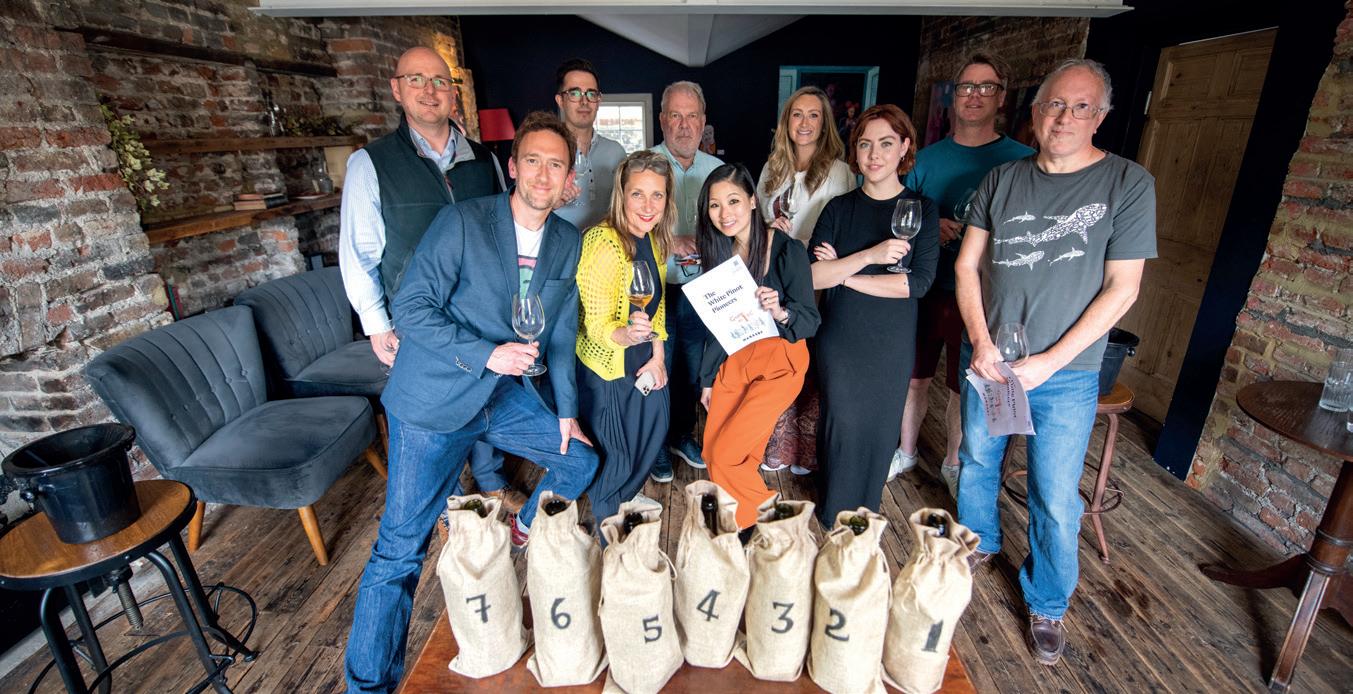
In the longer term, our ambition is for Marasby to expand from a wine-only platform into other UK-grown quality produce.
What is your favourite wine style or grape variety? Why?
Simon: I fell in love with wine via red Burgundy, so I’m super-excited about the quality of still Pinot Noir now being produced in the UK. While I don’t think it does, or should, try to mimic Burgundy, some of our Pinot is now verging on Burgundy levels of ripeness, complexity, and interest.
Talya: I’m a little bit partial to a glass of traditional method sparkling, and what’s really exciting – and could be a bit of a USP for the UK – is the number of amazing Blanc de Noirs I’ve tasted. Would highly recommend a glass with some homemade Old Winchester cheese straws.
I absolutely love an advert that popped up on the telly the other day. It is for a business called Workday – an enterprise management cloud.
While I have no idea what an enterprise management cloud is, this cunning business is undoubtedly firing up interest in its activities with its ‘Rock Star’ adverts, including five iconic rockers: Gary Clark Jr., Billy Idol, Joan Jett, Ozzy Osbourne, and Paul Stanley. As the ad points out, we are all too lazy when flagrantly using this elite term of appreciation.
I, too, have been guilty of using ‘Rock Star’ incorrectly in the past. I have even used this expression as a lazy descriptor – ‘this is a rock star of a wine’ – although it has to be a wine of precisely the correct style to warrant admiration of this exalted level. So it got me thinking, who are our very own (not) Rock Stars who make wines worthy of this moniker?



I have recently tasted a couple of wines that are so arresting, opinionated, and memorable that I think they genuinely fit the bill, and you will not be surprised to read that they
form the heart of this month’s article. And then something hilarious happened. I was catching up with some pals when they told me, in hushed tones, about Alex James’s recent exploits in wine.
















I know this epicurean expert has augmented his stellar musical career with a life in cheese, but furthering his remit into wine was somewhat of a scoop. And the timing could not be more compelling. My third wine this month is a genuine Rock Star wine; for once, this term can be used correctly by one and all!
£25.00




www.laithwaites.co.uk


Blur bassist Alex James is no stranger to Rock, and he is already a Star in both the music and the cheese world. He is also the curator of one of the UK’s favourite music, food and drinks events – The Big Feastival. A eureka moment inspired him to develop his BritPop brand into a wine label. As a SouthWest-living-and-loving man, he asked Ian Edwards at Jurassic Coast-based Furleigh Estate to help him realise his dream.
Furleigh makes superb wine under its own label as well as assisting Bride Valley (among others) to make some of the most exciting wines in the country. This bodes well for Alex, and it ensures that BritPop tastes as good as it sounds.

Made from 40% Chardonnay, 40% Pinot Noir and 20% Pinot Meunier this is about as classic a sparkler as it gets. Based on the 2018 vintage, the nose is welcoming, open and floral, promising depth and freshness on the palate, and this is precisely what happens. No stranger to harmony, Alex’s wine is the epitome of balance and poise, and it does something that the other two wines in this month’s column fall short of – it is a consummate crowd-pleaser!
While Exton and Ridgeview require a degree of expertise to appreciate their crystalline structures, BritPop galivants along, high-fiving every taste bud it encounters, and it does this with style, infectious excitement and, hidden beneath the surface, extraordinary skill, too.
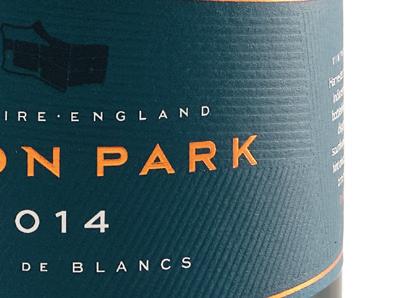
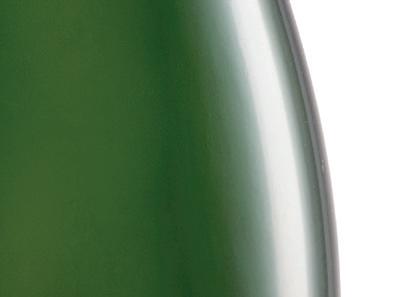


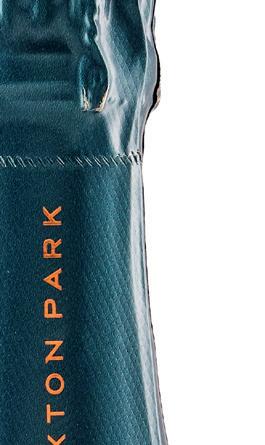
£65.00
www.extonparkvineyard.com
There are a handful of people you meet in our industry who emanate confidence, composure and extraordinary predictive skills. You will have your list, and I have mine. One name I expect we share is the palate behind Exton Park.


There is no doubt that Corinne Seely is a great winemaker, and yet her visionary skills are what lift her to Rock Star status, and this wine is conclusive proof because it was made from the first 20 rows of Exton Park’s finest Chardonnay block, and it is spectacular.
With nine years under its belt and six spent on its lees, this is a semi-mature, chalk-drenched, lime-pith-tinged wine with stiffness, rawness and incredible energy in its core.




While it has just been released, there is another decade under the bonnet here, and I do not doubt that this wine will form part of Corinne’s greatest hits compilation in years to come.



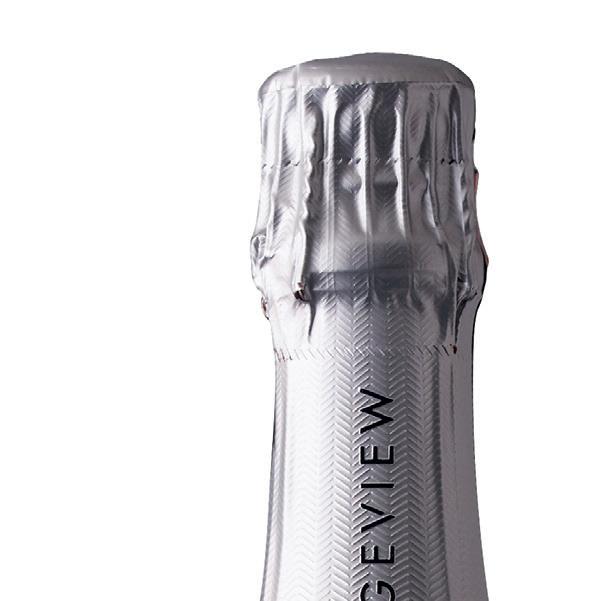
£75.00


www.ridgeview.co.uk



An exceptional limited edition, Ridgeview calls this a ‘singlevineyard, flagship wine; pure, precise, finely structured and only produced in tiny volumes in the very finest vintages’.




You can imagine stumbling across this sentence in marketing materials from any over-excited executive wishing to whip up interest in their products. But this sentence, in truth, under-promises because the glories found in this bottle mean there is nowhere else to go other than deploying the infrequently used term Rock Star for this wine. Not only that, this wine has a stadium-filling quality (assuming there is enough stock), and I say this because the flavour is utterly brilliant.
It is super-fresh, stunningly lemony and amazingly active on the palate. It must have been agonising waiting 42 long months for it to complete its lees ageing. I gave this wine a rare 19/20 in my notes, and if that doesn’t guarantee it Rock Star status, nothing does.



Recent research has identified the Crouch Valley as having ideal conditions for viticulture. When Bill and Sheila Greenwood planted the first vines at New Hall Wine Estate they may not have had the benefit of modern scientific research but they certainly knew their land when they planted the first vines in 1969. As pioneers and part of a very small English wine industry in 1976 New Hall won a Gold Medal at the IWSC. The continuing expansion and development of this commercial vineyard has led to many accolades over the years and in 2013 Piers Greenwood was named UKVA Winemaker of the Year.

The American businessman Henry Ford said

“If everyone is moving forward together then success takes care of itself,” New Hall Wine Estate is a fine example of this sentiment. Alongside its own success New Hall Wine Estate has also witnessed the strong growth of English and Welsh wine across many regions. New Hall is still a family business, with Chris Trembath at the helm and his daughter Becki as the next generation to join the team. There are many remarkable aspects to New Hall Wine Estate but one of the first things that any visitor will notice is the Railway Barn. The Railway Barn has a romantic presence because it is a tribute to the past and acknowledges the many changes that have happened in the countryside. The invention of and the continued expansion
of the railways created many possibilities for rural areas. Day trips and adventures into the countryside became possible for the masses until the Beeching Cuts of 1963. The Railway line that ran only a few hundred yards from the site of the current vineyard was axed. What was unknown to those decision makers in 1963 was that six years later the obsolete railway sleepers would be incorporated into the foundations of a new vineyard. The remnants of the industrial age would become the literal supports of the new vineyard at the forefront of a viticultural revolution. The initial planting of 850 Huxelrebe vines has now flourished into an amazing 125 acres with a variety of vines that is awe-inspiring.
The initial planting of 850 Huxelrebe vines has now flourished into an amazing 125 acres
Speaking to Andy Hares the vineyard manager at New Hall the full spectrum of grape varieties becomes apparent: Pinot Noir, Pinot Meunier, Huxelrebe, Pinot Gris, Muller Thurgau, Reichenstiener, Siegerrebe, Bacchus, Pinot Blanc, Schonbuger, Acolon, Rondo, Regent, Zweigeltrebe, Chardonnay, Ortega, Pinot Meunier, Fruhburgunder. This is already an amazing list that gives New Hall Wine Estate the scope to make some unique wines but still with an eye on the future next year there will be a planting of another ten acres and the new PIWI variety Caberet Noir will be added to the list. At a tasting of this new variety Rachel Appleton the assistant winemaker was excited by the possible black fruit flavours that this variety could bring to red wines.



Andy has been the vineyard manager at New Hall for eight harvests having previously worked in the French regions of Bergerac and St Emillion where he worked mainly with the Pinot Noir Variety. Describing his love of viticulture Andy said: “I love the variety and I love growing grapes, the life cycle of the vines is truly amazing.”

It is not always plain sailing for a vineyard that has so many different varieties planted in different decades. Andy explained that some of the rows are planted at 4m some at 3m and some at 2m, these variations representing experiments with the aspect of planting density. This creates certain difficulties around the machines that can be used.
There are also different growing systems, one of these is a rather unique adaptation of the Scott Henry that has a double curtain giving a beautiful if slightly dense canopy. This tendency towards dense canopy can sometimes lead to a lack of flow and the vines can then be susceptible to downy mildew so Andy is ever vigilant for the first signs of disease pressure. Andy and the vineyard team work constantly to improve the fruit quality. This has included systematically lifting the canopy aiding airflow and assisting with ripeness levels especially in the red grape varieties.
“This year around the middle of May the vines were about a month behind; spring was such a non-event,” explained Andy but by 5 July the day Vineyard visited New Hall flowering was over and owing to the recent warm weather the vines are now in line with what is considered average for the time of year.
Deciding what is average and what to expect is not easy on a site with so many varieties and Andy has deep knowledge <<

of all the intricacies of each of the planting blocks. Whilst looking through the vineyard Andy points out what will be some extremely elongated large bunches of Pinot Noir. “Large that is for Pinot Noir but very different in comparison to varieties such as Huxelrebe,” said Andy. Every year brings its own unique challenges “it is going to be an interesting year again,” he added with half a smile and half a frown.
“The Siegrebbe will be harvested the first week in September” explained Andy. Prior to Covid-19 the early ripening of the Siegrebbe would also coincide with a festival weekend that would see local families enjoy time amongst the vines. For 2023 there was a ticketed ‘Summer Vibes in the Vines’ event on 21 July which will include tours and tastings, music and open fire lunch. It is also possible to visit the cellar door on a Saturday and at certain times of year it is possible to travel the vineyard trail which has a beautiful map illustrating the varieties as visitors walk the 1km trail that offers views of the local wildlife as well. (As we stand at the entrance to the winery a fabulous brown hare hopped past, once a common sight in the countryside, this is just one of the many species to be found here.)
New Hall Wine Estate rarely has frost, “the weather is very site specific,”

said Andy. To illustrate his point in September 2022 the met office reported that some sites in the south east received rainfall well in excess of 150% of the long term average. When many other areas were relieved to have copious amounts of rain in September 2022 New Hall had absolutely no rain for the entire month of September. “You could literally see the clouds split as they passed over the site,” said Andy. This lack of rain led to a fall in yields of around 30% for 2022. In 2012 however, which was generally a poor year across the UK the unique climate of Essex and the Crouch Valley in particular meant that 33% of national production was harvested by the vineyards of Essex.
In terms of pests in the vineyard there is now little bird predation so there is no need to net the vines. Although Andy pointed out that when he started there was a grain silo full of nets so this must have been a task undertaken in the past. There are however quite significant populations of Muntjack deer and these are dealt with by leaving some sacrificial rows and the deer mainly stick to the one area of the vineyard.
Other pests in the vineyard are wasps. “The Rondo ripens early and the wasps love it,” Andy explained. Andy has found an unusual side effect of the product Sentinel – a fertiliser which contains the natural product salicylic acid – is that the wasps will stop feeding on the grapes within one hour of application and the rows that were earlier swarming with hungry wasps will then remain free for 7-10 days.
In France Andy worked on organic systems and New Hall is working hard to reduce inputs, undertaking disease modelling and using the latest technology such as a Sencrop station to ensure that applications are used to maximum effect. For the last four years New Hall have been using Sectormentor to build a pattern of data for the future.
The number of varieties at New Hall has indirectly influenced the purchase of a new Machine Harvester. These machines are impressive both in size and capability but at New Hall the New Holland machine harvester purchased in 2022 through Ernest Doe has been such a benefit bringing in the 220 tonnes of fruit from the 2022 harvest (Yields at New Hall have reached as high as 270 tonnes). Andy estimated it would pay for itself within five years. He was quick to praise the forward thinking of Chris Trembath for the decision to purchase the machine.
We understand that purchasing new production equipment is a big step for anyone and getting up and running as quickly as possible is incredibly important. Our installation service means that your machinery will be correctly set-up to enable you to get the most from it.
















































“There is a skill to picking fruit quickly,” said Andy and with 20-30 labourers for harvest for more than three weeks it becomes very expensive. Finally on the point of labour at harvest Andy concluded: “Ensuring an adequate supply of well trained and skilled pickers is only going to become more difficult.”
The problem of securing skilled pickers is compounded by the numerous varieties at New Hall as everything is ready at different times. The machine harvester has effectively taken a problem and dispensed with it. “We can pick an acre at 5am on a random Tuesday morning if that variety is ready and not have to worry about getting a team in and then occupying them for the rest of the day and we can leave fruit hanging longer without worrying about labour constraints, our numerous varieties make our harvest rather unique,” said Andy. In effect the machine harvester means that New Hall can work on the timescale that the vines determine rather than being influenced by other external factors. The early ripening Siegrebbe is a perfect example of the benefits of the machine harvester, “there is such a balance between what the winery want in the way of sugars and what we can give them from the vineyard; Siegrebbe becomes over ripe very quickly,” said Andy.
All the varieties at New Hall offer both those who work in the winery and those who work in the vineyard a fantastic opportunity to get a well rounded knowledge. With so many varieties here there are opportunities that are not to be found everywhere in the UK. It is surprising to learn therefore that Andy is looking for both an assistant manager and a vineyard assistant (offering an apprenticeship for this position). “It is an amazing industry to be involved with,” said Andy and anyone who finds themselves working with Andy and these
vines will build up their skill set very quickly.
Andy finally declared that his favourite variety to work with was Acolon. “It is the closest to the perfect grape with big bunches and it yields well,” he said. The winery team had different ideas for their favourite variety to work with Rachel Appleton who has been the production manager for three years choosing two varieties for very different reasons. “Siegrebbe ripens so early; for the 2022 season it was picked on 26 August which is really early and it is what I call ‘living the dream day,’” said Rachel. On this first day of picking all the winery staff, office staff and vineyard team pick the grapes together. “It is a really nice day of picking and tasting a few of the grapes and then we bring it back and make wine out of it and then there is about a week before the next variety is ready,” added Rachel. The second variety that Rachel mentions is Schonberger for its “extremely versatile, big berries that are a pretty green with a pink shine.” The head winemaker Olly Shaw was appointed on 19 May 2023 and on the subject of varieties Olly said: “I am looking forward to working with the variety Zweigeltrebe having not worked with this variety before but it can deliver a very concentrated style.”
‘heritage winery.’ This area has the capacity for storage of up to 70,000 litres but this is only the beginning.
There are double doors leading from this heritage winery and beyond is a really modern winery space. The winery was upgraded in 2021 by Graham Heath Construction and was ready to accept grapes about one week before the 2021 harvest began. Storage capacity has now increased dramatically to over 120,000 litres with 170,000 bottles produced under the New Hall label in 2022.
Working with UK suppliers such as Core Equipment, BevTech, Vigo and WR Services it has ensured an array of quality equipment in the new winery catering for every need during harvest. There are now 89 individual tanks ranging in capacity from 750 litres up to 23,500 litres. This allows the winery so much versatility to take advantage of the different varieties and within that the different blocks. In the future this will also allow the winemaking team to work with different yeast strains and “work with the reds to incorporate oak,” said Olly. Having a good relationship with UK suppliers has clearly been key as Jonathan Chaplin, MD of Core Equipment explained “We have supplied New Hall with a wide range of winemaking equipment including a labelling machine from Enos and high quality eccentric screw pumps from Kiesel. In addition, we have been their service partner for many years now, attending to their various pieces of winery equipment”.
From the entrance to the winery it is possible to see five varieties “which creates a spectacular autumnal display,” said Rachel. On entering the winery it is very obvious that this place is special. Not only is it incredibly photogenic it has a cosy and appealing vibe. Rachel and Olly smile as they describe it as the <<

All the varieties at New Hall offer both those who work in the winery and those who work in the vineyard a fantastic opportunity to get a well rounded knowledge
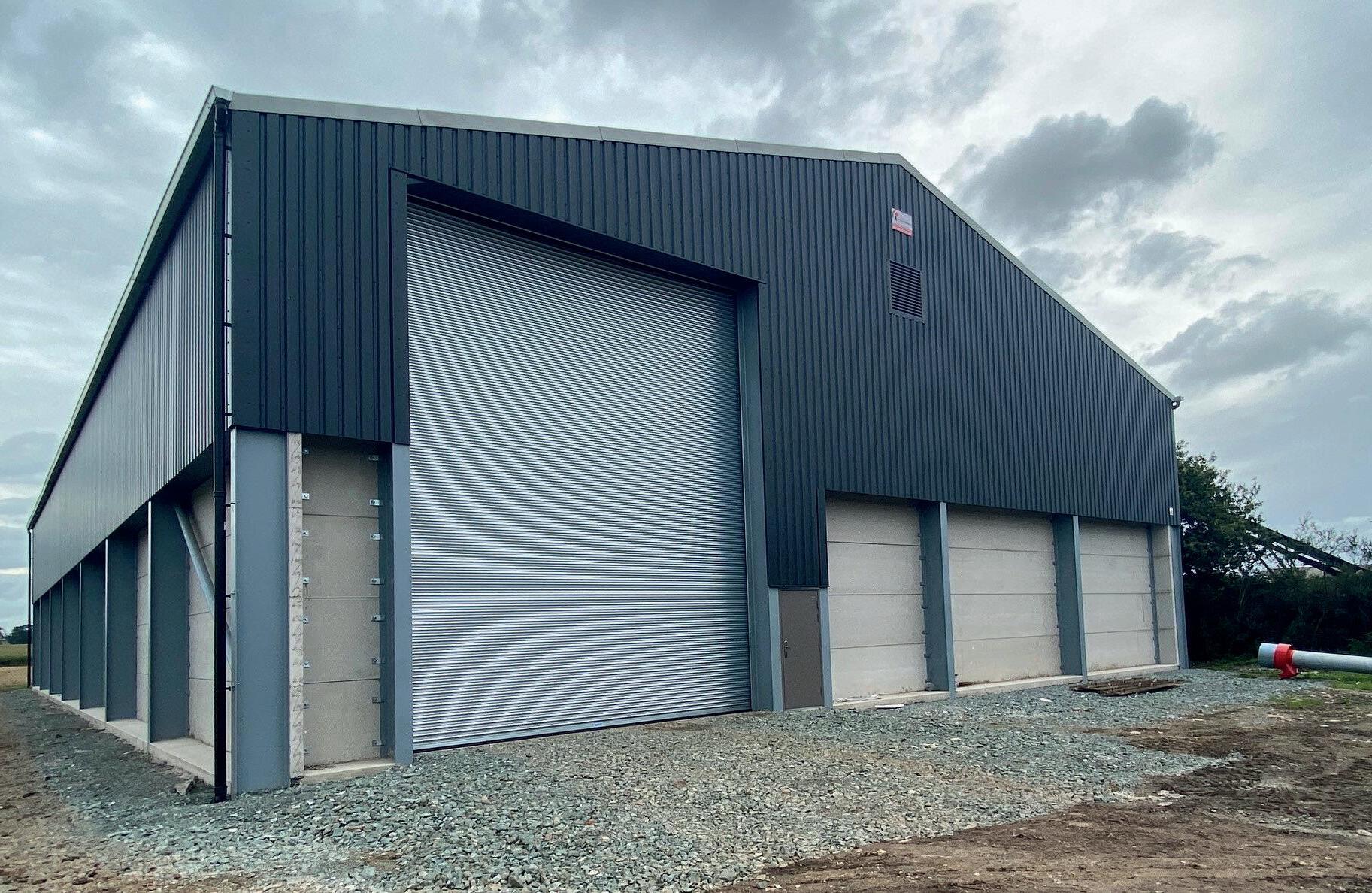











“We have gone down the blending route to get the core range right but we have the opportunity to touch base with our heritage because we have got such a lot of heritage here, celebrating and showcasing the old vines,” explained Olly. "If we have time we will do some more skin maceration on the Pinot Gris and the Bacchus but it is all about timing during harvest, you cannot wait around for eight hours with the press not doing anything,”
There is also a purpose built lab which allows extensive analysis to be undertaken with a sense of both “peace and patience,” explained Olly. “The more information we have about the juice and later the wine the better decisions we can make and better decisions make higher quality wine. With the amount of wine that we make it is important to be consistent and have more data so the lab is a fundamental part of that,” said Rachel.
There is plenty of room in this modern space and it has been designed so that the fork lift can be manoeuvred with ease throughout the building. This may seem an obvious necessity but it is something that can make a huge difference to the efficiency of a winery.
“Since there is not much disease pressure on this site and very little frost the fruit that we receive here in the winery is good quality,” explained Rachel. “You aspire to pick fruit when it is exactly ready and the machine harvester has made that a reality,” she added. “The fruit does not wait around either,” added Olly. The machine harvester is able to deliver four tonnes of fruit so within four to five hours the winery already has a press load. The winery has a large europress which will cope with 8-10 tonnes of fruit and a smaller press which will cope with 2.5-3 tonnes of fruit.
“There is a big focus on still wines at New Hall “84% of the wines we made in 2022 were still said Rachel.” As you would expect there are
numerous limited edition and single varietal wines additionally The Barons Lane wine range has a still white comprised of Huxelrebe, Pinot Blanc and Schonberg; a still rosé a blend of Pinot Meunier and Pinot Noir; and a red. During the visit it became very clear that the red wines of New Hall are in demand. “The streamlined range makes it a natural thing for people to have the red,” explained Lucy Winward Commercial Manager at New Hall Wine Estate.
“New Hall is producing 20,000 bottles of still red wine. Everything from 2019 onwards made a mark. The breakthrough came in 2021 because the winery team had more experience and the new winery had new red fermenters,” she added.

The demand for the New Hall red wine is not affected by seasonality like Rosé.
“We have not always been able to offer red wine to our on-trade clients before because we did not have the depth of stock that they rightly require. Since moving our model from fruit sales to wine sales due to increasing demand
of red wine, we can ensure continuity and reliability. Our investment in red production facilities, and the further planting of ten acres of red varietals next year, is a testament to our commitment for the production of quality red wine,” Lucy said.

The Barons Lane Red 2021 contains five varieties: Pinot Noir Prècoce, Rondo, Regent, Acolon, Zweigeltrebe and is a wine that is exciting, vibrant and interesting. With a retail price of £14.50 its growing appeal is completely understandable.
While at this amazing vineyard in the beautiful setting of the Crouch Valley it became clear that the Barons Lane Red is a reflection of the New Hall Wine Estate in so many ways. It embraces flair, incorporates imagination and above all celebrates variety with an ever focussed eye on quality. It sums up the whole vision at New Hall which builds on the past to look at the future. The remnants of the old railway line will follow the track way into the future.
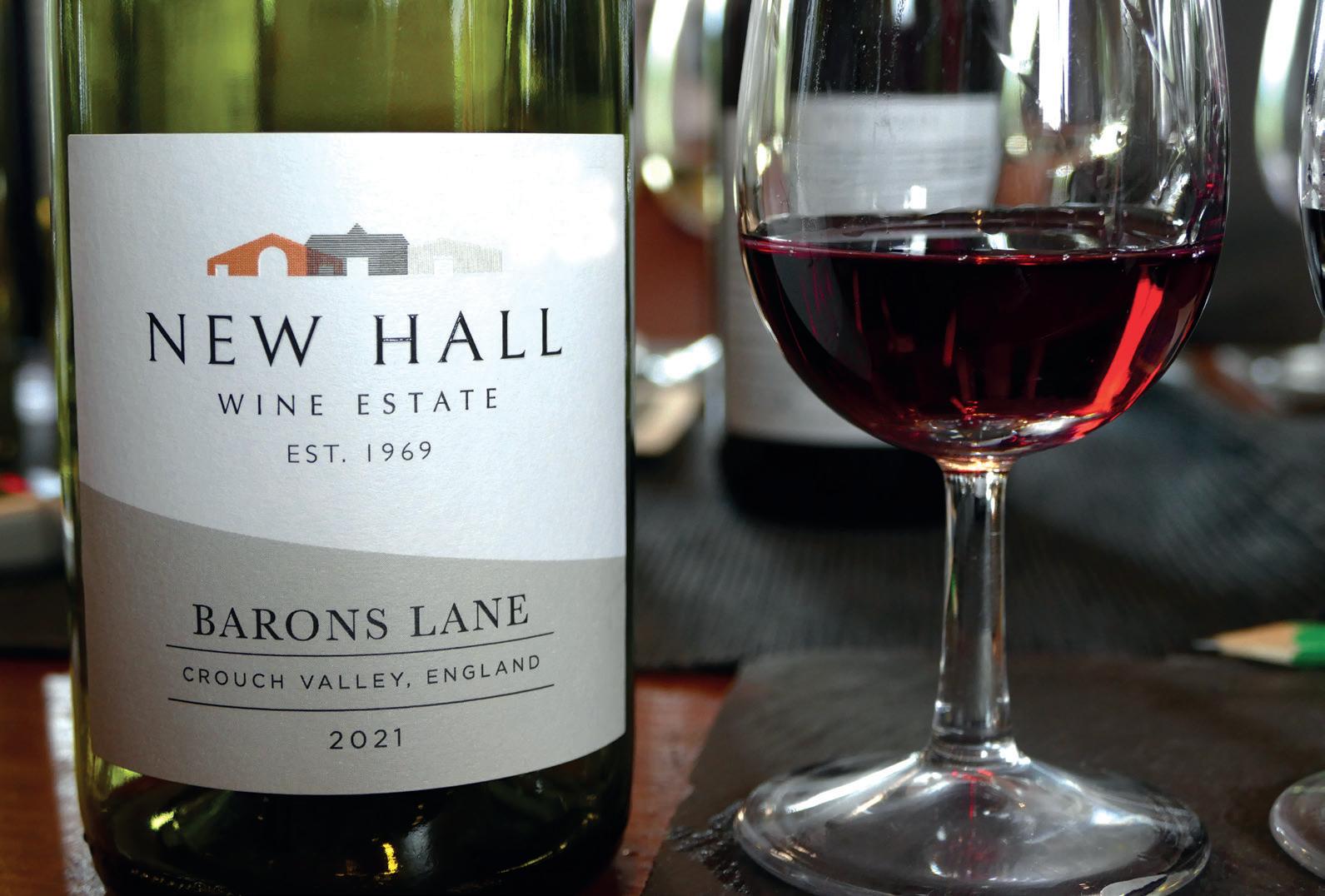
New Hall is producing 20,000 bottles of still red wine
This year, Plumpton College has been fortunate to deliver training courses outside of the college campus and in the regions.
Firstly, we hosted a Simonit & Sirch pruning course at Astley Vineyards in Stourport-on-Trent, which was a joint collaboration with WineGB West and WineGB Midlands & North. Participants from Yorkshire, Shropshire, Gloucestershire, Worcestershire, and even Inverness attended!
The course spanned three days, with two days in January focusing on pruning and a third day in May covering subsequent shoot selection. Master trainers Livio Tong and Mia Fischer traveled from Italy and Sweden, respectively, to deliver the course. They began with theory, covering grapevine biology and the vine's growth patterns, which inform the Simonit & Sirch pruning principles:
◆ Branching – shaping the vine's structure while respecting its growth.
◆ Respecting the vascular flow – ensuring sap flow continuity by separating desiccated areas.
◆ Cuts and crowns – reducing cut surfaces, respecting crowns, and making small cuts on one year old or two year old wood on the same side to minimise the risk of wood disease.
◆ Protective wood – leaving a portion of protective wood when cutting two year old wood to prevent desiccation from interrupting the main sap flow.
We then moved to the vineyard for hands-on practical sessions, one day each of pruning (January) and shoot selection (May). Astley Vineyards has vines of different ages, ranging from 50 years to more recent plantings,
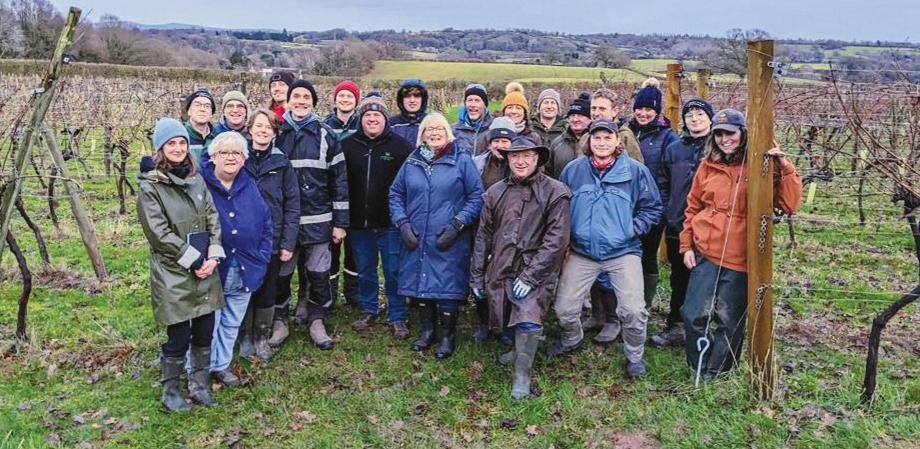
with Guyot and Cordon training systems. This allowed participants to learn and practice in various situations. We extend our gratitude to Astley Vineyards for allowing us to practice on their vines!
Besides learning about pruning methods, it was enjoyable to have vineyard owners and workers from across both regions come together to socialize and chat over lunch. The atmosphere was jovial and lively.
Secondly, Sarah Midgley conducted a Wine Faults course for the WineGB Midlands & North group at Yorkshire Heart. The course aimed to teach participants how to identify faults and taints in wines, understand their underlying causes, and recommend preventative measures and corrective actions for common wine faults.
During the course, participants tasted fault-induced wines to identify specific faults, such as Brettanomyces, volatile acidity, light strike, TCA, reduction, and oxidation.
The college is delighted to offer courses in the regions, making them more accessible. We also greatly enjoy traveling to other winemaking regions, meeting and conversing with practitioners, and, of course, tasting their wines and learning about the different styles across the country. Many thanks to the WineGB regional groups and the hosts for their hospitality.


Many people are familiar with buying the freehold or leasing a vineyard – but in some cases the landowner is looking to keep some involvement in the land. This gives rise to different models of working the land such as entering a Partnership, Contract Farming, and the subject of this article –Farm Share Agreements.
An FSA is an arrangement where the landowner/farmer continues to own the land, buildings, and other fixed assets such as machinery but decides to bring someone on board that provides the labour (called the operator). The gross proceeds of sale (not the profits) for example from the sale of grapes or the sale of wine, are shared between the landowner and the operator in their agreed percentage allocations (e.g. the gross proceeds may be split 60% to the landowner and 40% to the operator). The parties can also share any subsidies if this has also been agreed. The costs of other inputs and supplies such as chemicals or spraying will be agreed between the parties and documented in the FSA. This arrangement means the landowner can continue to benefit from tax reliefs including capital gains tax.
According to the DEFRA survey (2019) agriculture typically has an aging workforce and in the United Kingdom, around a third of holders were over 65 years old. Many do not have an obvious successor to take over their farming operations. However, there are many young farmers coming through the ranks, especially with the interest in English wine, who would like to have a foothold in this industry but do not have the money to buy or lease land. This is the synergy that the FSA can help with

and means landowners can phase out their workload and responsibilities over time.
Despite what is said on the tin, an agreement will be determined based on its form –meaning even if you call it a Farm Share Agreement, but it acts like a Partnership Agreement then it will be treated as a Partnership Agreement. In an FSA the profits are not shared, instead the gross returns are shared, and each party pays for its own expenses. So, for an FSA to differ from a Partnership, each entity (which means each separate person or business) must have a separate business with their own expenditure and receipts. If an expense (such as sprays) is shared, then the supplier will need to provide two separate invoices for each party. Otherwise, it can be easier for the parties to just allocate different expenses to each of them and not to split invoices. From HMRC’s perspective each entity will submit their own tax and VAT returns
A big cornerstone of a Partnership is called ‘joint and several unlimited liability’. Taking this in turn ‘joint’ means the partners are
jointly responsible for the expenses and debts, ‘several’ liability means one of the partners can also be responsible for all of the debts and expenses (i.e. if a claim is made, it can be made against one partner only even though the debts relate to the whole Partnership); and ‘unlimited’ means the liability is not capped at a figure. An FSA does not have joint and several unlimited liability. Instead, each party alone is responsible for its own expenses.
Drafting an agreement (whether an FSA or otherwise) – is an opportunity for both parties to properly discuss all the points (e.g., how long should this arrangement last for, how will we split the gross receipts, who will pay for the sprays), and it should be a collaborative process. I have always found this to be the biggest benefit to having an agreement properly drafted. Unlike selling your land, working with the other party is especially important in situations where both parties will have an involvement with the land going forward and will be working side by side. The relationship between the parties will continue long after the ink on the FSA has dried so continued trust and communication are key.
The relationship between the parties will continue long past after the ink on the FSA has dried so continued trust and communication are key
One question we are frequently asked at VineWorks is, “What should a vineyard yield per hectare?” The answer is not straightforward as yields vary significantly.


While some vineyards in the UK achieve high yields of 10 tonnes or more per hectare, the national average is less than 5 tonnes. This level of production often makes it challenging for vineyards to generate profits. To ensure the long-term success of a vineyard, it is crucial to understand the factors that influence yields and implement strategies to optimise them. These influences are diverse and many in number. However, we can break them down into three main categories:
stage for the upcoming season. Pruning should be done according to appropriate specifications, with a focus on modern gentle pruning methods. This approach ensures the selection of the most fruitful two-year-old wood as replacement canes and spurs. It also promotes an open renewal zone, allowing for better light penetration and high levels of flower initiation for the following year.
Timely completion of all summer tasks is essential. For example, mistimed wire lifts, can cause excessive shading in the fruiting zone, increasing disease risk, reducing flowering ability, and limiting inflorescence initiation for the following year. Implementing a robust spray program in collaboration with an experienced agronomist helps protect vines from infections and ensures adequate nutrient supply. Providing sufficient nutrition during flowering is particularly important to support high yield levels. Keeping the undervine area weed-free and well-aerated reduces competition and enhances soil microbial activity. Regular soil analysis and efforts to improve soil health and fertility also contribute to better nutrient availability and retention.
management Previous season’s weather
Weed and cover crop management Weather around flowering
Wet vs dry summer
The decisions made during the establishment phase of a vineyard are crucial for its long-term success. Suitable site selection is essential, although it is rare to find a piece of land that meets all desired criteria. Conducting a thorough survey of the land with viticulture in mind enables informed decision-making. Ground preparation and matching the rootstock to the soil type promote balanced and healthy vine growth, leading to good yield levels. Careful consideration of grape variety selection is also important, taking into account budburst and ripening timings, which can affect a vine's susceptibility to frost and late-season weather conditions.
Planting density plays a critical role in yield per hectare. While higher vine density increases yield potential, it can also make site management more challenging. It is important to find an appropriate density and implement a trellis system that maximises vine number while allowing for even canopy growth. Planting vines too densely can lead to issues such as shaded canopies, increased disease pressure, reduced ripening, and limited yields. Finding the right balance is key.
The work carried out in the vineyard throughout the year has a significant impact on yields. Winter pruning is crucial for setting the
Grape growing is inherently influenced by climate, but understanding and managing seasonal events can minimise their impact on vineyard yields. Frost-prone sites require an active frost defence plan, utilising tools such as bougies, frost fans, heaters, and cold air drains.
Innovations like UV-emitting cables, which are currently being trialled in a vineyard managed by VineWorks, show promise in managing frost. Appropriate canopy management and timely spray applications help mitigate other seasonal weather effects. Late-season rain, frost, or hail can damage the crop significantly, making it crucial to react quickly and effectively during harvest. Grazing pests, like deer, can pose a threat to early spring growth in vineyards, often necessitating the installation of deer fencing. Monitoring certain insect populations is essential for implementing a robust integrated pest management system that utilises all available control and protection methods.
Achieving optimal vineyard yields in the UK requires a comprehensive understanding of the factors that influence grape production and implementing effective strategies. Average yields of less than five tonnes per hectare pose challenges for profitability, making it crucial to address the diverse influences on vineyard yields. By understanding and implementing strategies within these three main categories, vineyard owners can work towards improving yields and ensuring the long-term success of their vineyards.
In the extreme weather of the summer of 2022, Nyetimber in West Sussex anticipated a bumper harvest. They went on to lead the UK’s largest ever grape harvest with 325 hectares picked.
However, yield is not the same as area. Yield takes into account the volume of grapes produced in a specific zone. Nyetimber may have the largest estate, but more significantly they also saw a record number of grapes from those vineyards, over 1,600 tonnes in total.
Writing regularly about viticulture means that I talk endlessly about balance. Prune your vines, but not too much. Feed your vines, but not too much. The list goes on. And now that a new summer is upon us, we are talking about yields. Surprise, surprise once again balance is the key.
If you want to make a lot of wine, then you need a lot of grapes. But if you want to make a lot of excellent wine, then sometimes you may have to sacrifice some of that abundance in favour of quality. The conditions of 2022 gifted Nyetimber with the opportunity to have both. I wanted to find out more about how vineyards of varying sizes find their own perfect balance. How can yield be optimised without compromising on the taste of the finished product? And what factors are prompting those decisions in 2023?
Charles Martin, the Senior Viticulturalist at VineWorks speaks words of caution. “When dealing with high potential yields in the UK,” Charles said, “the inclement weather we sometimes receive during the season or towards harvest increases the risk of not ripening the crop properly.
It is therefore important to find a balance between quality and yield, especially in cold climates. In the UK, matching canopy management with crop loading is essential, and the ultimate goal should be to make informed decisions that lead to a balanced approach."
To maintain quality whilst optimizing yield, there are a number of options available, depending on how established your vineyard is:
◆ Vineyard site selection: Choosing an ideal location with suitable soil types, exposure to sunlight, and good air circulation is crucial for maximizing yield potential.
◆ Grape variety selection: Selecting grape varieties that are wellsuited to the local climate and soil conditions is important for achieving optimal yields and quality.

◆ Viticultural practices: Implementing effective vineyard management techniques such as proper pruning, canopy management, and pest and disease control can contribute to higher yields.

◆ Technology and innovation: Adopting modern technologies like precision viticulture, weather monitoring systems, and vineyard management software can help optimise vineyard operations and improve overall yield.
◆ Research and expertise: Collaboration with agricultural researchers, oenologists, and viticulturists can provide valuable insights into best practices, pest management strategies, and vineyard optimization techniques.



No vineyards or brands, just contract services for others
⌂

• SITE SELECTION & SITE ASSESSMENT: Correct choice of site is vital in the UK’s northerly winegrowing climate.
• VINEYARD DESIGN: Design of your trellis system and density of plantation is offered as a standard part of our service.

• PRE-PLANTATION ADVICE: All advice and organisation of soil & site preparation works.

• GRAPEVINE SUPPLY: All vines sourced through one partner nursery, proven vine establishment over many years.
• VARIETIES, CLONES, ROOTSTOCKS: All combinations created to suit your vineyard site and target wine styles.

• PLANTING: Planted by GPS guided machine, accurate to within 8mm.

• TRELLIS MATERIALS: We supply everything, sourced direct from the factory to ensure lowest possible prices!



WE HAVE 50 YEARS COMBINED EXPERIENCE IN VINEYARD MANAGEMENT. YOUR VINEYARD WILL BE IN THE GROUND FOR MANY YEARS. GET IT RIGHT FIRST TIME, WITH DUNCAN MCNEILL AND VOLKER SCHEU OF VINES DIRECT LTD.
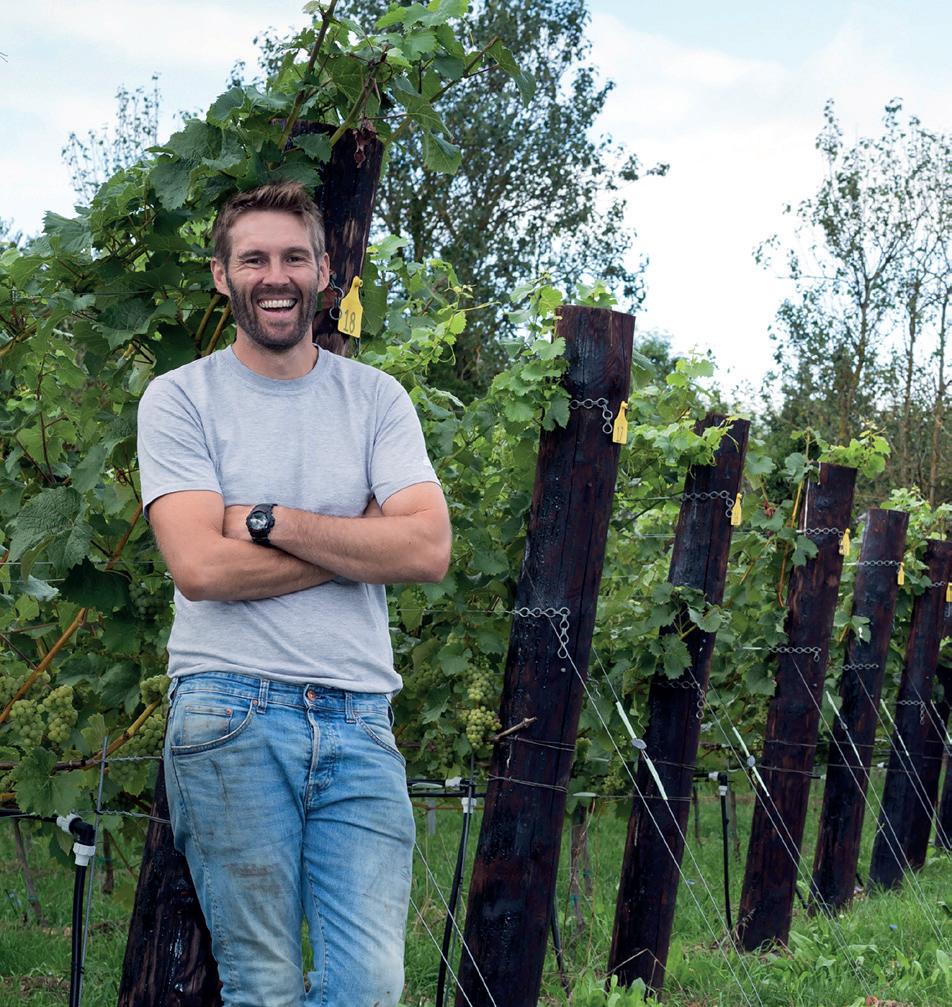
CONTACT DUNCAN MCNEILL ON 07972 668370 OR EMAIL

At the Rathfinny Wine Estate in Sussex, they are expecting just under 600 tonnes of grapes this year from 93 hectares of vineyard, although about a third of that area is still under development. Allowing for that puts Rathfinny’s yield at around the UK average.


Rathfinny’s Vineyard Manager and Viticulturist Cameron Roucher told me about their expectations for the coming harvest:
“Yield in the last couple of seasons has been a bit lower than normal due to remedial pruning that we have undertaken. However, this has set up very good carbohydrate stores for this season and is evident in the evenness of growth across the site. This year’s bunch size looks to be some of the largest in recent years.”
A sharp focus on pruning techniques and carefully scheduled nutrition management are the key to Rathfinny’s successful crop. Cameron goes on to tell me that they occasionally green harvest if the crop is looking a little over what
they want but “generally this isn’t necessary.” It is unsurprising that the Estate takes such a measured, sustainable approach to yield management. Rathfinny became the first grower-producer of sparkling wine in the world to be awarded B-Corp status earlier this year. Offering practical advice to other vineyard managers looking to increase their yield, Cameron emphasised the importance of
pruning yet again:
“People often lay too many buds down and then push the vine too much, ending up with lots of short shoots. Look at the previous season's growth and prune to what the vine is capable of. Then it will be able to store carbohydrates better and have greater potential for more buds on the wire and therefore better yields.”
The New Hall Wine Estate in Essex was established in 1969 and has 125 acres under vine. These well-established plants allow Andy Hares, the Vineyard and Estate Manager to focus on the “correct balance between yield and quality.” They observe the conditions as the season progresses and undertake remedial actions like green harvesting as necessary.
This season got off to a slow start. “We had a very disappointing spring,” Andy observes. “It felt long, cold and damp. But the hot spell we had in June brought the vines back on schedule.”
The estate found itself in one of the driest places in the country during last summer’s heatwave which made a significant dent in their yield. However, the situation looks much improved already in 2023. Discussing the issue in the second week of July Andy remarked that there had already been more rainfall than in the whole of the month the year previous.
Plus a settled spell during flowering helped that process along. There was no great difference between daytime and night-time temperatures resulting in very large inflorescences and excellent bunch sizes - unusually large, in fact, for certain varieties like Pinot Noir.
Work at New Hall is now focused on trimming the vines and then moving on to leaf stripping to manage the canopy for optimum ripeness. They are also coming to the end of their preventative fungicide program as the dry conditions mean they tend to harvest
quite early – usually starting in early September.
This year their autumn program will be transformed as they have purchased a new harvesting machine. Not having to plan for the organisation of picking teams in advance means that they can leave the fruit hanging for as long as they dare. And they will enjoy a less intense workload on actual harvest days.
Andy advises that vineyard managers should look to their winemakers for guidance on decision-making around yield. The process and the wine styles required will inform how to find that balance between quality and quantity. He stresses that communication with producers or grape buyers is key to managing your yield in the correct way for your business.
Speaking to Jonathan White, the Marketing Director for Gusbourne at Ashford in Kent, it is clear that they are not willing to push for a higher yield:
“We have purposely selected lower-yielding clones (predominantly from Burgundy) to create fuller and more flavoursome grapes,” Jonathan tells me. “Most of our vineyards are also mature by English standards, so this too has a reducing effect on yields. We conduct regular green harvests throughout the growing season to thin the crop and maintain the health of our vines too (a crucial factor for us as we specifically produce only vintage wines and so require our vineyards to create fantastic fruit for us each and every year).”
That laser focus on grape quality has been reaping rewards. Gusbourne’s Blanc de Blancs 2018 picking up a Best in Show award at the 2023 Decanter World Wine Awards. The sparkling wine, made with 100% Chardonnay, was described by the judges as having “remarkable assurance and accomplishment.”
Yields are not fixed year upon year. And there is a limit to how far human intervention can affect the amount of fruit a vine will produce in a certain season. Far more influential are the effects of the weather, as we have seen in the great fluctuations in yield over recent years. Stephen Skelton’s incredibly helpful vineyard production data for Great Britain shows an average yield of nearly 46 hectolitres per hectare in the long hot summer of 2018, compared with a figure of just over 23.5 hectolitres per hectare from the 2021 harvest, described by some commentators as an “exceptionally difficult” vintage.
Gusbourne take steps to manage the yield from their 90 hectares of vineyards depending on the style of wine they are producing. “When making still wines, for example,” Jonathan explains, “we drop additional fruit throughout the growing season to ensure full richness and concentration is found in the remaining grapes. Our Blanc de Blancs is 100% Chardonnay and our Blanc de Noirs is 100% Pinot Noir. Some growing seasons also favour one grape over another!”
Sandridge Barton, the home of Sharpham Wine along the River Dart in Devon, have been growing since 1981. They are in the process of expanding their plantings, bringing them currently up to about 40 acres. While in ‘average’ years the vineyards tend to produce around the average of 2 to 4 tonnes per acre, the CEO and Chief Winemaker, Duncan Schwab, is expecting incredible things from the 2023 yield.
“This year flowering has been absolutely immense,” Duncan smiles. “We’re hoping to get around 90+ tonnes from our 25 acres of actual cropping acreage - over 3.5 tonnes an acre.
“Flowering was about two weeks earlier than usual and we didn’t have any rain around the pollination period. I usually go around and tap the flower florets when they finish flowering to see the set. Normally I would get about 25% that would fall off in my hand. This year we didn’t get anything which means that the set is pretty much perfect. It’s a good indicator - but a slight worry in that we now need the good weather
to ripen up a large harvest.”
They are now indulging in a spot of green harvesting so that the vines can put all of their energy into smaller numbers of viable bunches for ripening. The Sandridge Barton team are taking the bunches back to two per cane where some are now throwing out three or four.
“It’s always nice to let the vines do what they need to do and then make decisions after flowering,” Duncan tells me. “Then you’re one step ahead of the game. At this time of the year, before the vine puts its energy into the actual crop we can dictate what it’s going to concentrate on. A lot of that work is based on forecasting weather conditions.
“Quality always outstrips quantity as far as we’re concerned. We’ve spent a lot of energy on the winery side to make sure we’ve got sorting tables and tank control systems in place so it’s all lined up with quality. But at the same time, the bank manager is always happier when the quality is there along with the quantity!”
Trying to establish a solid foundation for
their future yield, Duncan is also leading the process of removing all the flowering clusters from their three-year-old plantings. They are holding a good crop, but he prefers that they put their energy into their roots in preparation for a bountiful harvest next year.
As an interesting aside, the Sandridge Barton Madeleine Angevine grapes got sunburn on the skins for the first time in 2022. The vines went into self-preservation mode and shut down because of the heat, causing the final harvest to contain more acid and less sugar. So despite having a generally fantastic vintage, they observed that the cool climate varieties had real trouble with the heatwave. They had (typically) just planted more Madeleine as Duncan really likes its floral aromatic qualities and it had previously been “a real banker in the South West.”
However, the difficulties experienced by early cropping varieties like Madeleine and Pinot Noir Precose in the exceptional weather has made decisions on future plantings less clear-cut. Anecdotally this suggests that climate change may make varieties like these less viable in Devon in the future.


Not every vineyard is long established or has the benefit of a team with decades of experience behind them. I wanted to find out more about how a smaller, younger business approaches the question of yield. Whinyard Rocks are a new low-intervention vineyard in Powys.
“There’s no real need for yield forecasts given our small scale,” said owner James Kinsey-Jones. “Our yield is naturally inhibited by our low-intervention approach, as we don’t use a lot of chemical input - and our site is very westerly and high, so it’s not necessarily the highest yielding location anyway. We are right at the edge of what’s viable, so we have planted lots of early ripening varieties to help us out.”


With many new plantings, production is steadily increasing year on year. Now in
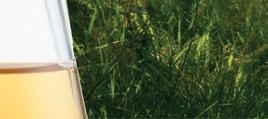

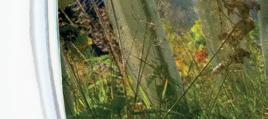




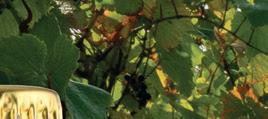
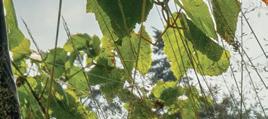
their third commercial season, James’ focus is on creating wines that represent the local environment. As a small producer, the identity of the vineyard and making unique products is the most important thing to establishing themselves in the marketplace. Their geography means that they harvest a few weeks later than other UK growers, giving the grapes more time on the vine to develop their aromatic profile.

Their delayed growing season also helps them to avoid the perils of spring frosts to a degree. The inflorescences looked healthy and full initially, although it is uncertain how much damage recent exposure to wind and rain at their altitude may have caused to the flowers. At the time of writing, they are waiting to see how well the fruit ultimately sets but they are feeling hopeful.
A new vineyard manager without an industry background, James has found a great deal of support through training funded by the Welsh Government’s Welsh Wine Special Interest group. Whinyard Rocks are undergoing a learning process about how their new growing environment actually works throughout the year as their vines come to maturity. The question of yield will come into sharper focus for them later.
DRINKS CLUSTER: https://businesswales.gov.wales/foodanddrink/growing-your-business/clusters



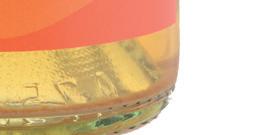



















warmest June on record did wonders for fruit set and canopy growth in many vines, suggesting the 2023 crop could easily be 20% up on last year. Hutchinsons agronomist Rob Saunders offers some advice on how to feed this potential.

One of the biggest factors influencing our ability to take large crops of good quality grapes through to harvest is late season nutrition. Alongside favourable weather and robust disease control, optimising nutrition is crucial for maintaining healthy canopies with the photosynthetic capacity to supply developing bunches with everything they need, both for yield and quality. Skimping on the canopy now risks undoing all the hard work that has gone before.
Tailoring nutrition to the needs of individual situations is by far the most effective approach, so growers should base nutritional strategies on the results of petiole or leaf analysis, ideally done earlier in the summer. Knowledge of site history and soil status is also useful.
It is not too late to get leaf samples tested, so this may be worthwhile if not done already. Relative to the value of the crop, leaf analysis is a very small investment that can have significant benefits.
Focus testing on sites or areas that have previously underperformed; those where potential deficiencies have been seen; or where vines are relatively recently established and may not yet have a well-developed root system. Sites carrying big crops are another to prioritise for testing. Occasionally, leaf analysis may not show any obvious issues, despite crops not performing as expected, so in such cases it is necessary to delve deeper, looking at other physical soil conditions and biology.
Magnesium, iron and nitrogen are three key nutrient deficiencies that can inhibit chlorophyll formation, and low levels of the first two commonly show up on tissue testing. Nitrogen deficiency is not usually an issue on deeper, richer soils in wetter parts of the country, however it can be a problem in some areas, especially thinner soils in the drier south east. For magnesium, there are two main treatment options, the most popular being magnesium sulphate, which is low cost and proven to work well. Another option, where growers require additional nitrogen, as well as magnesium, is magnesium nitrate, which offers a more plant-available nutrient form than sulphate.
Urea is another effective nitrogen source, while a more plant-available option would be products based on amino acid feeds, such as Bridgeway or Megafol, which can be particularly useful during periods of stress, or when there is a large energy demand on vines.
For iron, EDTA chelate forms are cheapest, but they are generally not as plant-available or effective as iron metalosate, which supplies amino acid chelated minerals in a ‘softer’ form that can be used immediately by plants. Note that for ground applications, EDDHA iron chelates are used, but these are not particularly light stable, therefore are best applied in winter, or via trickle irrigation, so nutrients can be washed straight into the soil.
From veraison onwards, the nutrition focus generally switches from feeding the canopy, to bolstering grape quality.
Two nutrients are pivotal in this respect; potassium supports strong fruit fill and Brix accumulation, while yeast-available nitrogen affects fermentation and the wine’s flavour profile. A high potassium:nitrogen ratio also helps reduce Botrytis risk.
Potassium can be applied in various forms, including non-chlorinated pure foliar products, such as PureTech Potassium, or as potassium sulphate. For those wanting extra nitrogen, potassium nitrate is another option. Metalosate potassium is also available, and while experience is limited, it may be considered in future.
Other beneficial nutrients between veraison and harvest include: calcium, for skin strength; magnesium, to reduce bunch stem necrosis; boron, to improve berry shape, size and sugars; zinc; and iron, which can also improve quality.
Finally, it is worth noting that one major reason why many crops have done so well thus far, is due to the higher light levels and warmth experienced during flower initiation last summer.
Fruitful buds start forming in leaf axils (where the leaf stalk meets the growing shoot) around a year before vines flower, when cells at the tip of developing tissue form primordia – the name given to the organ or tissue when at its first recognisable stage of development.
Light and warmth facilitate this process, and while we cannot influence the climate, we can manage canopies to ensure sufficient light reaches the replacement canes growing from the crown, destined to be next year’s cropping canes. Good flower initiation for 2024 is reliant on those canes getting light now, so make sure they are not being shaded out by overly dense canopies.

It is flowering season and, so far, I am pleased to report that Mereworth Wines’ vines are doing very well. Mereworth Wines’ Head of Production, Scott Gebbie, met me at the vineyard to tell me about the science behind pollination, flowering and fruit production.
The vines are hermaphroditic and so are self-pollinating and small clusters of flowers and grape berries can now be seen on the vines. The fruit is produced on a two-year cycle. Fruit for next year has already begun development in the buds of this years’ shoots.

The weather has a great deal of affect upon the yield of the vines.
Mereworth Wines are having a good growing season so far, and there is promising potential for a high yield, but there are still a few months to go, and we all know how changeable our glorious British summertime can be!

Following flowering and a successful pollination, grape berries will form and continue to grow as hard green berries for a further six to eight weeks. Then comes veraison which is the time when the grapes start accumulating sugar, begin to soften and, in the case of red grape varieties, the skins change from green to red.
Scott will be arranging for more sprays to be undertaken in the coming weeks as the vines are particularly susceptible to disease at this time of year. Leaves on the lower parts of the vines will be stripped from around the “bunch zone” to provide more sunlight and airflow, both of which help greatly with maturation of the fruit and reduce disease pressure.
The supporting wires have all been moved up the growing vines to provide them with the necessary support. Scott will wait for as long as possible before topping the vines (as removal of the growing tip encourages the growth of unwanted lateral shoots in the bunch zone).
We will visit the vineyard again late August once veraison has occurred and to hopefully find that the vines have produced lots of grapes!
Meanwhile, Mereworth Wines have recently released their 2020 vintage. Bottles are being disgorged before being served and available for purchase at the winery which can be found at Brewer Hall Oast. I will certainly be visiting to try some! All 2022 wines have been bottled, the process of secondary fermentation has been completed and are now “ageing on lees” and will continue to do so for around three years.
Mereworth Wines offer winery and vineyard tours and you can also join them for their weekly events:
Fish & Fizz Friday
Every Friday. Food served 12-8pm
Pizza Saturdays
Every Saturday. Food Served 12-6pm
Sunday Sessions
Kayleigh Ireland, an Associate Legal Executive who is part of Whitehead Monckton’s agricultural and rural land team, re-visited Mereworth Wines’ Wateringbury vineyard during the first week of July.
This year’s Vineyard & Winery Show, taking place on 22nd November will provide an even broader array of wine tastings for wine makers.
Already known for providing growers and wine makers with a broad spectrum of wines to expand knowledge and to benchmark their own wines against, this year’s Vineyard & Winery Show will go one step further by providing even more space dedicated to wine tasting at the event. Not only will there be over 100 UK wines available for tasting but this will be now split over two rooms, with Sparkling in one room and still wine in the other.
Matthew Jukes, world renowned wine
writer, will once again be conducting a master class at the show, taking 80 guests through six UK wines that he feels warrant acclaim. Many of the wines that Matthew selected for tasting last year have either gone onto win awards, or simply sold out – something that regularly occurs to wines that he has selected for praise. Matthew’s tasting will be taking place in the Astor Pavillion at 1pm. Tickets are £25 each with money raised donated to Matthew’s chosen charity, The Drinks Trust.

Taking place at 3pm, also in the Astor Pavillion, will be a tasting of six Piwi wines, all from vines that are suitable for
UK conditions. Sponsored and hosted by Rebschule Freytag from Germany who are experts in Piwi vines, the hour long session will take guests through an array of exciting new varieties that in the words of Sam Doncaster (who is a well known columnist for Vineyard magazine and who works for the firm) “these new varieties will provide ground-breaking taste opportunities for the UK winemaker”.
The Piwi tasting will offer winemakers a glimpse of what new varieties are available to the UK, with some fantastic options on offer. Tickets are offered at £10 each, with the proceeds also donated to charity.
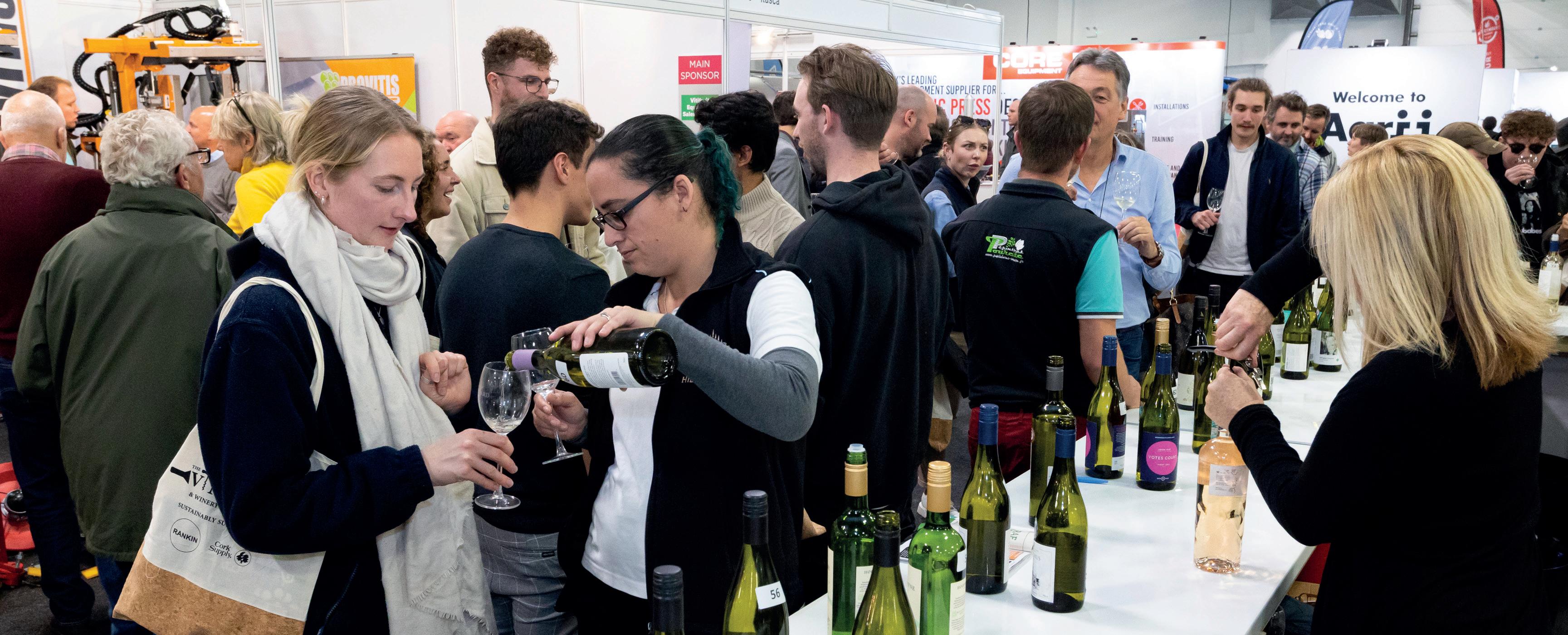




The aqueous foam, which is environmentally harmless and expected to be much cheaper to use than current alternatives, has been developed over the past six or seven years by George Klat, himself a grower, and is expected to revolutionise the industry.
George’s company, Frosco Ltd, has worked with scientists at Imperial College London, to perfect the foam, which is described as being “ultra-stabilised by a quantum effect at the molecular level” and will also protect crops of all kinds from extreme weather conditions, as well as acting as a fungicide and pesticide.
It will be distributed in the UK by Vinecare UK, one of the most respected vineyard management companies in the industry and ideally placed to help growers benefit from the breakthrough.
Vinecare UK’s Paul Woodrow-Hill, who
has worked closely with vines, growers and winemakers since 1987, has been following the development of the product and offering advice and support during the journey.
As well as offering a broad range of management, consultancy and contract labour services, Vinecare UK grows its own grapes for contract sale across 14 hectares of land in the south east, giving Paul and his team a hands-on perspective. He is convinced that the new product will have a major impact on the industry.
“It will be an absolute gamechanger,” he commented. “This is a harmless, completely stable, environmentally friendly foam that will protect vines against up to ten degrees of frost and can just be washed off when the job’s done. It also has fungicidal and biocidal properties and is likely to cost about half as much as more traditional anti-frost measures.”
One of the current methods of keeping frost at bay, burning large paraffin candles, or bougies, is not just expensive but damaging to the environment, while doing nothing risks devastating damage to grape buds. George pointed out that a single late spring frost across Europe in 2017 caused losses estimated at €3.3 billion, with only 18% of the crops insured.
The inspiration for Frosco was George’s observation that a snow fall had a “perhaps counter-intuitive” beneficial impact on overwintering root crops by trapping air within its crystalline structure, insulating the crop and keeping the ground above freezing. He also noticed the protective foam produced by froghopper nymphs or spittlebugs – otherwise known as cuckoo spit – which protects the nymphs from UV radiation and predators. <<









The challenge was to create a liquid that could be easily changed into a foam so that it could be applied to the vines, but which would remain as a foam and not turn back into a liquid until the threat of frost had passed the following morning.
Frosco is designed to be applied with foam lances as frost approaches. When the temperature approaches zero, the borders between each individual bubble start to crystallise, trapping air in thousands of tiny pockets and insulating the crop. The formulation then stays intact until the next day, when it can be washed off with water to allow insects to go about their pollination business.
“As frost generally occurs on still clear nights the threat of being washed off by rain is minimal,” George added.

Frosco then worked with the molecular engineering hub at Imperial College to make the foam thermally resistant and prevent any temperature changes. The result is a unique formulation that provides 10°C of protection in both directions, which means it can be used to protect against excessive heat as well
as frost. Preventing berry scorch is just one of the additional areas where Frosco could prove useful.
“The possibilities of this technology are almost endless,” George commented. “It could be used across the world to protect wheat, coffee, peaches, apples and almost any other crop from temperature extremes. It’s like we’ve come up with the ‘WD40’ of agriculture.”
One unexpected benefit is that the long contact time of the foam with the plant, combined with its high pH, means aphids are first trapped and then killed by Frosco. It also acts as an aroma barrier, so no other aphids are attracted to the plant. Because the foam is essentially liquid based, it is similar to a cloud, allowing photosynthesis to continue to take place in a stable temperature.
Paul and the Vinecare UK team were the clear choice as the UK distributor to take Frosco forward, having supported and encouraged George throughout its development. Paul also helped set up a field trial for the product at Plumpton Agricultural College.
“The trial worked well in demonstrating how the product works and highlighting the stability of the foam, but ironically we chose a year in which there was no significant frost,” commented Paul. “All the other lab tests, research and trials shows it will do exactly what it says on the tin, though, and we are delighted to have been asked to act as the sole distributor for the UK.”
Developer George has a vested interest in the success of his invention, since he has his own five-acre Wolf Oak vineyard at Knowl Hill in Berkshire, an enterprise that benefits from management support provided by Vinecare UK.


A keen environmentalist, he was determined to come up with a frost protection solution that was totally sustainable and contained no toxins. Paul believes his answer to this long-standing and potentially catastrophic threat will open up many more wine-growing sites that are currently felt to be too risky.

And that, he believes, will be a good thing for the industry, which is currently demanding more and more grapes to meet the demand for English wines.









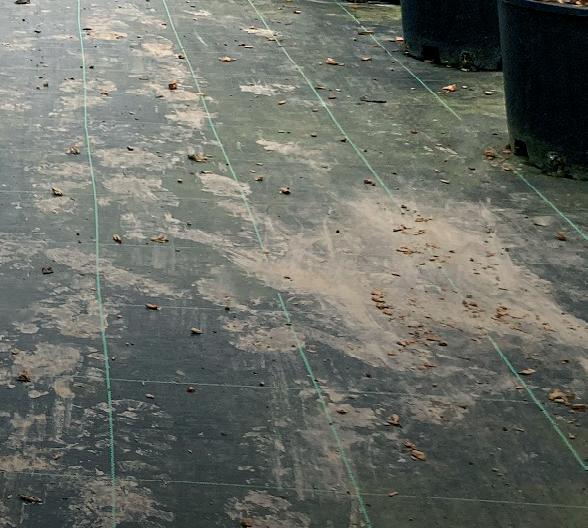
In partnership with Imperial College, an efficient means of protection, for your crop and for your environment. For more information visit www.frosco.io
























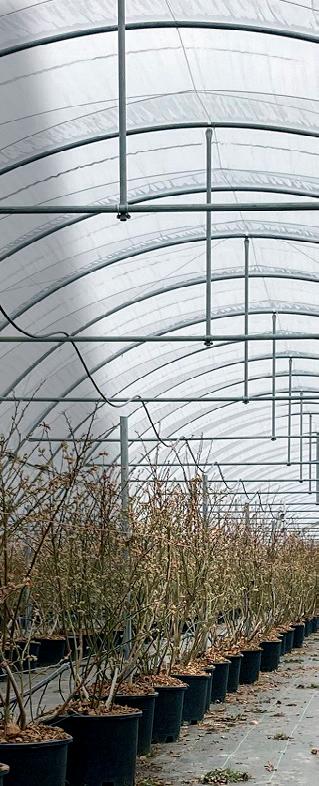
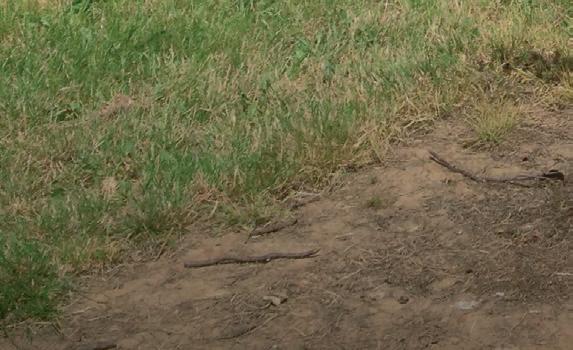
The Agrii fruit team is comprised of 13 horticultural agronomists, together with ancillary product specialists and decision support services who collectively advise on soft fruit, top fruit and vineyard business across the UK.




Agrii is pleased to be working with Vine Care UK Ltd.


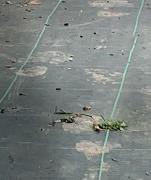


For more information, please contact your usual Agrii agronomist, our Customer Services Team on 0845 607 3322 or email fruit.solutions@agrii.co.uk

“Winemakers across the region are always looking for more fruit,” he said, adding that he felt many of the vineyards he managed were likely to achieve an impressive 12 tonnes per hectare this season.

The demand for fruit is reflected in the success of The Grape Exchange, an online platform Paul set up to bring together buyers and sellers and formalise a process which had been “just a bit too informal” in the past.
“Lots of deals were being done on handshakes, but that sometimes led to problems and disagreements down the line,” he explained. “Now buyers and sellers can register on the site and make deals online that are binding on both parties.”
The Grape Exchange, now in its third year,
has also helped to create good returns for growers, who can now expect £3,000 a tonne or more for popular, in-demand sparkling wine varieties.
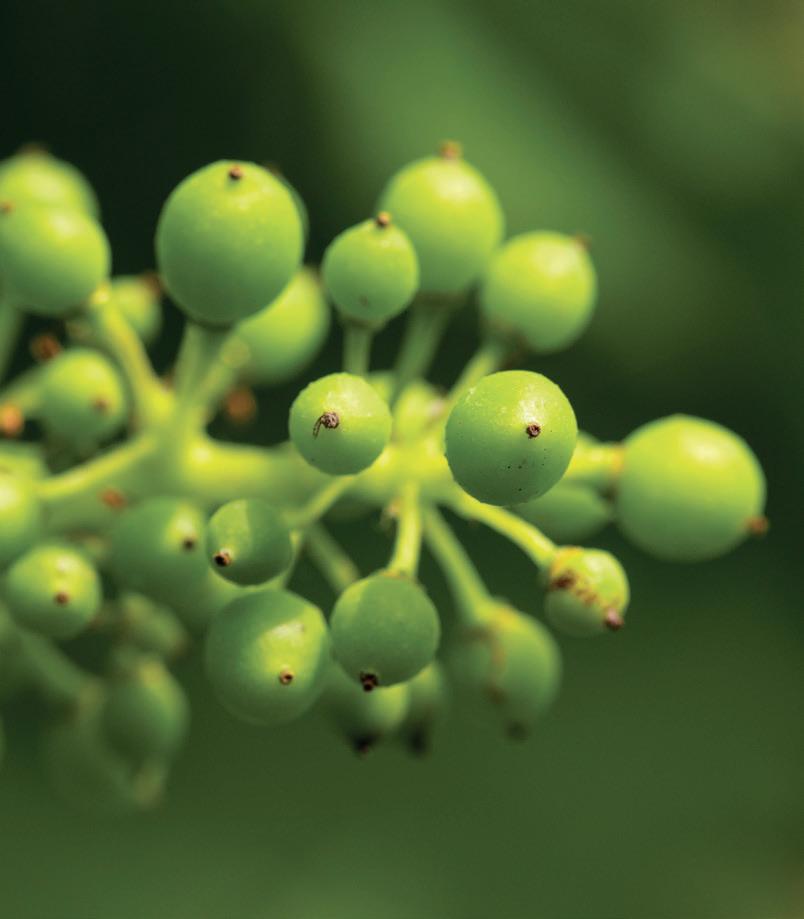
It was introducing the demand and supplybased auction platform and helping the price find a sustainable level that prompted Vinecare to invest in growing grapes as well as helping others do so. The company now leases a number of sites, including the five acre Trotton Estate vineyard near Rogate in West Sussex where Vineyard photographer Martin Apps took these photographs. The sandy soil is ideal for the classic Chardonnay, Pinot Noir and Pinot Meunier varieties, grown alongside small parcels of Pinot Gris and Bacchus.
With 36 years’ experience in viticulture,
Paul has worked at a number of the South East’s best-known vineyards. After joining Nyetimber in 2006 he oversaw the vineyard’s expansion from 35 acres to 435 acres in just five years.

It was in 2011 that he set up Fruits of Labour to bring overseas workers to the UK to help growers across the industry find seasonal workers. Four years later he rebranded the company as Vinecare UK to reflect what had quickly established itself as his primary market.
He is not a fan of Brexit, which has now left him unable to meet the demand he faces for seasonal workers. His 150-strong workforce of people with settled or pre-settled status is just about enough for the contract work he does
for most of the year but leaves him having to do a fair bit of juggling at harvest time.
“We once had a labour force of 800, but I just can’t get anywhere near that number now,” he said. “And I can’t make use of those brought in under the temporary seasonal worker scheme because I’m not an end user. It’s having a big impact across the industry.”

As well as regularly supplying labour to more than 30 vineyards, Vinecare UK supports clients across the south and south east with advice and management support and looks after around 15 vineyards, generally smaller sites of ten acres or fewer. “The sort of size where the owner

needs professional advice and support but can’t justify employing a full-time vineyard manager,” Paul explained.
As well as caring for vineyards on a contractual basis, Vinecare UK also provides services such as planting and trellising. While some vines are still planted by hand, in most cases Paul brings in German contractor Minges, a tried and trusted fifth generation family firm with the experience to match.

The Vineyard Store is another of Paul’s ventures, a one-stop shop for vineyard supplies including wire, vine tutors and the usual broad range of fixtures and fittings. The Vineyard Store is also the UK’s sole

distributor of Magon posts, constructed of galvanised, construction grade Europeanmined steel and retailing at about half the price of leading brands.
The store in Lewes, Sussex is open for faceto-face visits by appointment only, but is always available online. It’s clearly a sign of the times that the warehouse is about to be doubled in size to meet demand.
While Paul is clearly a hands-on character, he is quick to pay tribute to the support of vineyard manager and The Grape Exchange director Steve Burnett, while office manager Jo Healy is another vital member of the Vinecare UK team.
I know, many of us went into winemaking with a very naive and romantic view of what it was going to be. I will try to list some basic important topics for those who are thinking about starting to make wine so they are aware of what they’re getting into. This list can also help to give some perspective to those who are already a wine producer but may be looking to go to the next level or simply make improvements.
◆ Start from the end
◆ Space
◆ Accept mistakes
◆ Winemaking skills and plans
◆ Be unique or compete for price
◆ Are you planning to make profit?
Maybe not in your lifetime
It’s impossible to plan everything on a piece of paper with evolving circumstances and shifting targets. However, it’s feasible to plan to be flexible so start by asking yourself some key questions about market, wine-making, winery set up and also some more personal ones such as, which lifestyle do I want?
Starting from the end, helps to visualise where you want to go and how to achieve a realistic plan according to your specific profile. Making wine is a lifetime project and if you don’t love it, sooner or later, you’ll give up. Loving it can also be a journey, which starts from somewhere else becoming stronger overtime or vanish. I’ve never met a professional wine producer or winemaker who doesn’t dedicate his/her entire life to it. So, let’s forget working eight hours a day and having regular days off or planning to buy a sports car instead of a better tractor.
Do it early to save money or you’ll never properly do it!
The continuous challenge that many winemakers have to face, is the lack of space. This leads to lots of wasted time and money along with uncomfortable working hours moving things around over and over
again. Simple operations might turn into big manoeuvres simply for setting up, cleaning and tiding up.
Think about: Space to store wine and equipment in the right conditions reducing double or triple handling, suitable space and ground to safely and efficiently operate a forklift, doors and roof of the proper size and height correct spacing between tanks to allow an easy cleaning and maintenance.
This is the tip of the iceberg for an efficient winery set up. Efficiency, easily becomes a financial and sustainable benefit for the environment, aesthetics, quality, workers happiness, health and safety.
Mistakes are part of our life and asking the right questions or seeking advice helps to drastically reduce them.
Mistakes comes with a cost and the most pricey are the beginner mistakes. They usually happen on fundamental decisions that can drive to consistent capital losses, inefficiency or frustrations of seeing things not going as planned.
Miscalculations can and will occur, we can only do our best to capitalise and minimise them by learning from our own and other peoples experience.
Grapes in a specific terroir, dictate what we can make with them, not the other way around, we are just the humble judges of it.
Simple as this might sound, it takes dedication, success, failures and a lifetime of refinement with continuous adjustments in a changing environment.
A winery is like an organism where the different aspects play an important role and everything needs to be synced to work properly.
Producing wine professionally, making independent decisions, takes more than reading a couple of books, studying three years or working five harvests: this is just a good start.
I’ve
Making wine professionally means being a constantly hungry student seeking for continuous improvements.
Making wine is probably one of the best professions in the world, and in our small industry can be even more rewarding.
Although, there are many good wines around, if we don’t want to compete just for price and fill the market with copies of the “same wine”, we need to be able to express, drive and influence our unique style, terroir and philosophy. Price is crucial and it strictly relates to the efficiency of managing all operations.

Depending on what your aspirations are, making wines requires big investment, serious hard work and realistically no profit in most cases for many years. I can’t be loud enough when I say doing your homework and planning ahead, validates the theory more than once. Speak with a whole team of professionals before starting. I’m not a financial planner and a financial planner, is not a winemaker… In order to be able to put things in perspective a multidisciplinary team is very useful to draft the big picture before going into technical details.









At Vogelsang, we never lose sight of what matters to you: economy and ease of use.



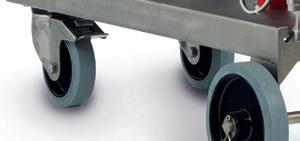



As innovators in the field of pumping techniques, we have developed a pump especially for the winemaking industry to help move liquids and solids without losing any vital flavour and quality of the wine.

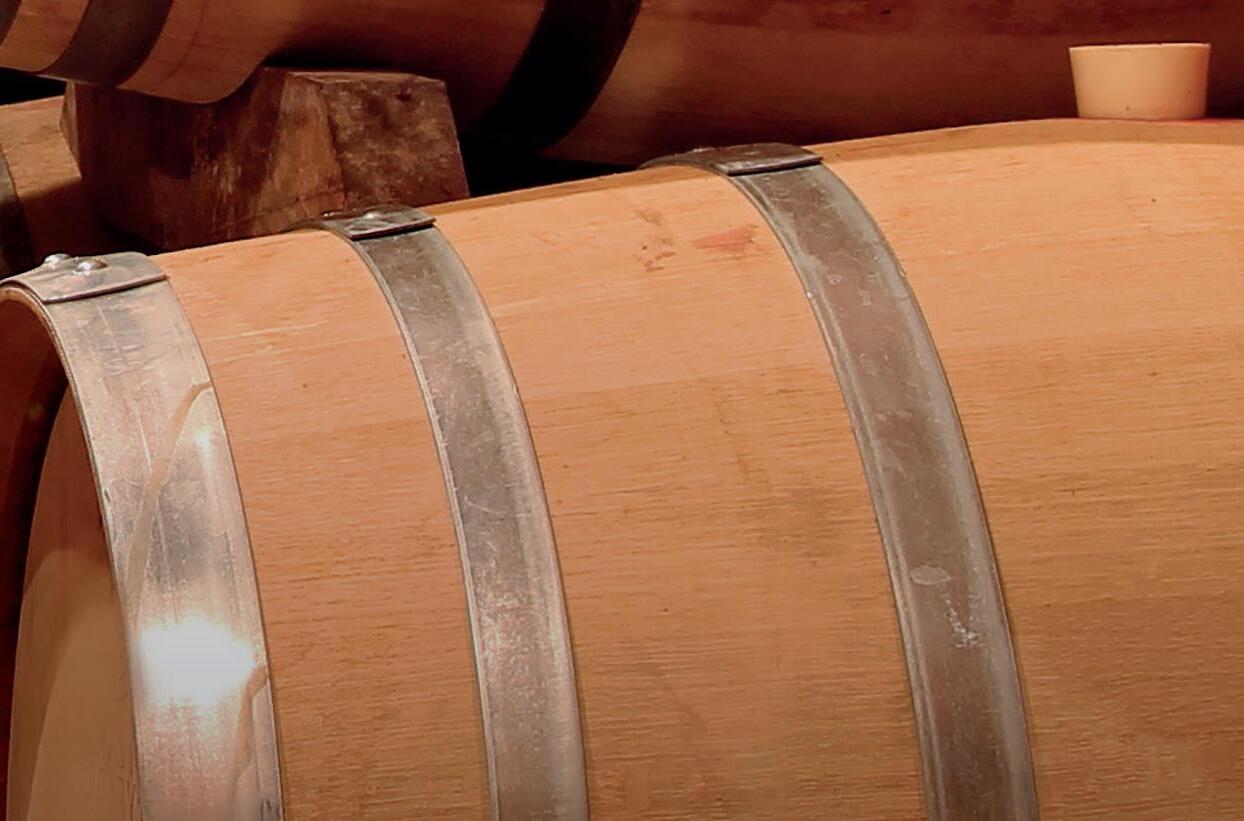
The compact, intelligently designed rotary lobe wine pump is created specifically to reduce wine oxygenation through its quiet and gentle operation, and is ideal for recirculation or pumping to and from the cellar, and use in transportation, storage and bottling.

Grapes, seeds, must and wine, everything remains unchanged during the transport process, for the highest quality of the final product.













Contact person: Richard Love
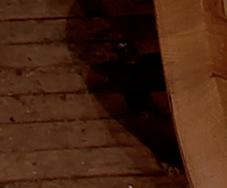








Mobile: +44 7765 902140 | richard.love@vogelsang.info
vogelsang.info
On 5 July at New Hall Vineyard in Essex Vineyard magazine attended a wine tasting conducted by Sam Doncaster. This was one of a series of winetastings designed specifically to introduce PIWI varieties to growers and winemakers in England and Wales.

In the lovely tasting room at New Hall vineyard winemakers and viticulturists from Dorset, Suffolk and Essex were taken through a selection of unfamiliar varieties. There were some sceptical comments at the beginning of the evening with one winemaker suggesting that customers have just got used to the idea of Bacchus as a grape variety but by the end of the evening Sam had won the room. It was not just that these varieties offer greater disease resistance whilst offering attractive yield values but that these wines all examples from cool climates offered incredible flavour profiles and a versatility of wine style that was quite astonishing.
Introducing the evening tasting Sam said with a smile: “This is going to start a revolution.”
Described by Sam as a lovely variety with the possibility of yields reaching 12 tonne a hectare. There were two sparkling wines followed by four still wines from this grape variety showcasing the versatility of the variety.
One of the still wines was an off dry style from “way over on the north-east side of Germany arguably one of the coolest places that anybody grows vines on the continent, adjacent to this block of vines of Cabernet Blanc is Bacchus they are capable of growing in the same climatic conditions and that is relevant to the UK and interesting,” said Sam.
To many of the winemakers in the room this was the first experience of this variety and yet one of the wines has been produced by the same family for 20 years giving them plenty of vintages to hone their skill with this variety. Approximately 150 families now make wine from this grape,”
said Sam. “These varieties are already in the mainstream in Germany, you can buy these wines in supermarkets, villages and cafés,” he added. To illustrate the point Sam introduced the final Cabernet Blanc from a producer in Forst, Pfalz carrying the highly prestigious VDP mark.

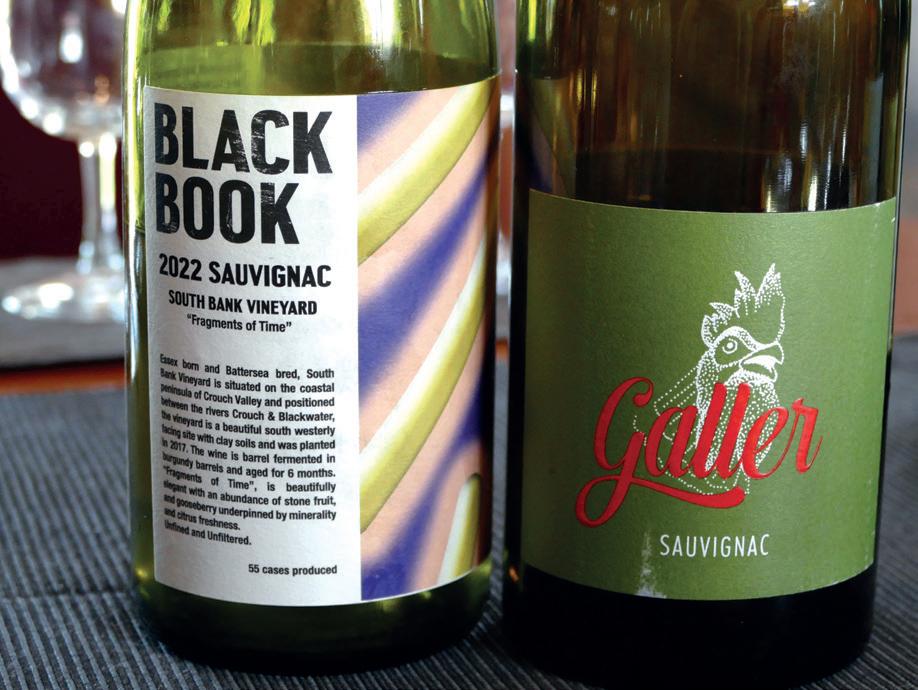

This variety was included in the tasting because field trials and anecdotal evidence indicate that in frost prone areas the second shoots are particularly high yielding. The obvious benefits for cool climate winemaking.
Another flight of four wines. This tasting
was really interesting in that it included an example from a winemaker in England.

This variety was familiar to me and I am aware of several pioneering vineyards in the UK that have planted this variety and already make wines from this grape. Sam was able to present one of these wines from a producer in Kent and the variety continues to impress. One of the winemakers present suggesting there is much it can offer in the blending of still red in England and Wales.

The last variety in the tasting was perhaps the most surprising. Two red wines both made in cool climates and both with huge
alcohol content. One wine having 14.5% and the second 15.5% all in attendance were amazed by not just the alcohol content but how both wines were different in style but both equally high quality. This variety can achieve great things for cool climate winemaking.
The atmosphere at the end of the tasting was full of energy and those present all felt that they had benefitted from the experience. Some went away pondering the extra something that these vines might be able to add their already excellent wines. If you get the chance to attend one of these tastings please do not hesitate these varieties are just like the English and Welsh wine industry; innovative, sustainability aware and a force to be taken seriously.
Sponsored and hosted by Rebschule Freytag from Germany who are experts in Piwi vines, the hour long session will take guests through an array of exciting new varieties that “will provide groundbreaking taste opportunities for the UK winemaker”.



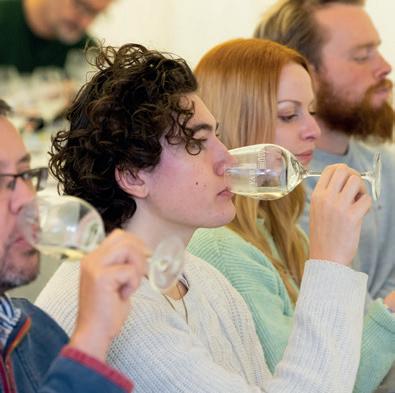
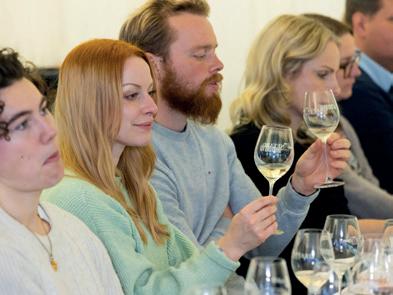





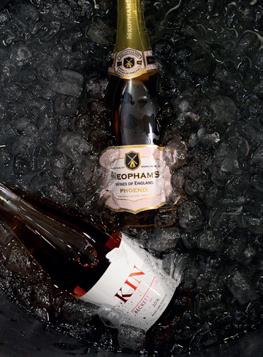
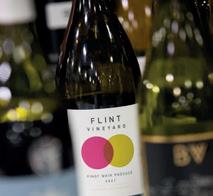

Tickets are offered at £10 each, with the proceeds donated to charity. Book
WineGB is the national trade body representing the vine growers and winemakers of Great Britain from the largest producers to small hobbyists. Our members work together with the organisation to develop strategy, expertise and marketing opportunities for long-term, sustainable success.

On 7 July, we held our annual WineGB Awards lunch to celebrate the bestperforming wines of the year in the breathtaking Drapers’ Hall, London.
West Sussex’s Digby Fine English secured their place in the Hall of Fame this year, scooping up four trophies, including Best Classic Cuvée Vintage, Top Sparkling, and the regional trophy for the South East with their 2013 Vintage Reserve Brut. This performance led them to be crowned Supreme Champion.
It was another successful year for Sugrue South Downs as they were awarded trophies for Best Classic Cuvée NV/MV for Cuvée Dr Brendan O’Regan MV and Best Blanc de Blancs for their Cuvée Boz Coldharbour Single Vineyard 2015, as well as being named Best Boutique Producer.
Ridgeview’s Blanc de Noirs 2015 was named Best Blanc de Noirs, and Bluebell Vineyard Estates’ Hindleap Rosé 2016 was awarded the trophy for Best Sparkling Rosé.
Key wins were also gained by Essex’s Tuffon Hall Vineyard, winning Best Still Rosé and the regional trophy for the East with their Pinot Noir Rosé, Beatrice 2022 and Devon-based Sandridge Barton, picking up the trophy for Best Still Pinot Noir and regional trophy for the West with their Pinot Noir 2020, which was also the joint winner of Top Still Wine.
There were triumphs for Kent as Gusbourne was awarded the Trophy for Best Chardonnay and named as the Joint Top Still Wine for their
Join us on 5 September for our annual Trade & Press Tasting, the key event for the English and Welsh wine industry, bringing together producers from across the country. This year, the tasting is being held at a new location: the stunning Battersea Arts Centre in London.
Key features include:
◆ Individual exhibitor stands
◆ Stands representing regional vineyard associations, featuring smaller commercial producers
◆ Focus tables to highlight some of the styles now produced in Britain
◆ Focus tasting table featuring the Trophy winners in the WineGB Awards 2023 Registrations are now open for bonafide members of the wine trade and press.
9 August 2023
Vinescapes training: Preparing for harvest in the vineyard
5 September 2023
WineGB Trade & Press Tasting
Chardonnay Guinevere 2021. Gusbourne was also awarded the trophy for Estate Winery of the Year. Fellow Kent producer Chapel Down lifted the trophy for Best Still Bacchus for their Kit’s Coty Bacchus 2020 and Best Prestige Cuvée for their Kit’s Coty Coeur de Cuvée 2016.
Sussex’s Wiston Estate won the Contract Winery Trophy, Hampshire’s Candover Brook was named Best Newcomer and was also the recipient of the regional trophy for Wessex, while Berkshire’s All Angels won the regional trophy for the Thames & Chilterns, Staffordshire’s Halfpenny Green secured the same accolade for the Midlands & North with its Chardonnay 2020, and Monmouthshire’s White Castle Vineyard picked up the regional trophy for Wales with its Pinot Noir Reserve 2021.
Two new trophies were introduced this year: the Pioneers’ Trophy, whose first recipient was Ridgeview Sparkling Red Reserve NV, and the Chris Foss Sustainable Wine Trophy, awarded to the highest-scoring Sustainable Wines of Great Britain-certified wine in this competition – this year’s winner was Gusbourne Chardonnay Guinevere 2021, adding to the wine’s list of accolades.
Co-chair of the judging panel, Susie Barrie MW, commented: “What’s perhaps most satisfying about chairing this competition each year, beyond the sheer joy of being able to taste and compare so many of the UK’s
finest wines, is seeing new names appear on the list of medals. For a competition like this to have value, it needs to attract the best of the best, whether new or established, large, medium or small. We want to taste the wines of producers who push the boundaries and are uncompromising in their quest for quality, and we have yet to be disappointed. A huge thank you to everyone who enters the WineGB Awards, I feel so lucky and privileged to judge this competition.”
Fellow co-chair, Oz Clarke OBE, added: “We judges get such a thrill when we realise we’ve given medals to wineries we didn’t know, and it’s really rewarding to think we’re setting them on the path to greater things. We have a wine nation that has barely begun to exploit its potential. Every year we have more growers and winemakers brimming over with imagination and ambition. Every year new areas of Britain stand up proud and say – we can do it too. We have the chance in the next generation to become one of the world’s greatest cool climate wine nations. And this year’s Awards competition shows that we’re going about it in the right way.”
A big thank you must go to the WineGB Awards headline sponsor, Rankin, to co-sponsor of the WineGB Awards Lunch, Bevica, and to all the trophy sponsors for supporting this event.
14 September 2023
NIAB Vine & Wine Discovery Day
22 November 2023
Vineyard & Winery Show
While many will continue to focus exclusively on hand-picked fruit, demand continues to increase for machine harvesting solutions in the UK.
During our Pellenc demonstration day, the consensus among vineyard managers and winemakers was that mechanical harvesting is going to be a necessity for the future, particularly if labour costs and shortages continue.
For still wine varieties, mechanical harvesting seems to be a no-brainer and wineries are adapting their receiving lines to make it easy to accommodate dolavs and lorries.
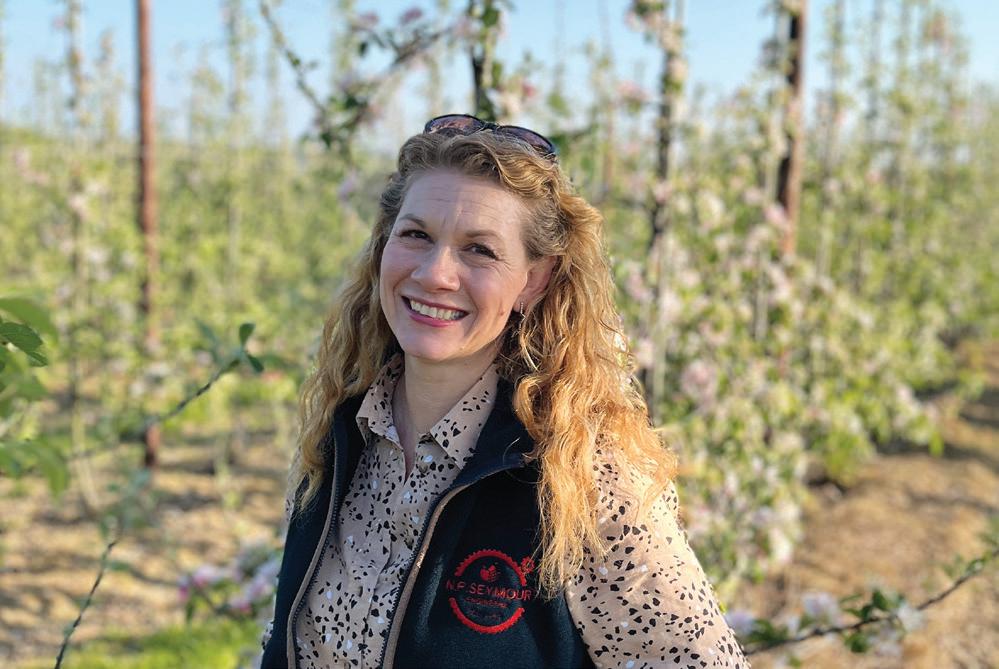
On the sparkling front too, a contract grower in Herefordshire has invested in a Pellenc this year and his entire crop will be machine harvested and used for fizz production.
Last year we also delivered a Pellenc Grapes’ Line 80 trailed mechanical harvester to a family-run vineyard in East Sussex for the 2022
harvest, and on the contracting side, Sam Barnes, of SJ Barnes Ltd, continues to run two Grapes’ Line 80s to cover around 200ha per year.
There is no doubt that mechanical grape harvesters are a more economical option when it comes to bringing in the final crop, costing around £90 per tonne for an average yield of around 10t/ha.
“Anyone with over 60Ha would find it justifiable to invest in their own Pellenc,” said Sam Barnes, founder of SJ Barnes and specialist vineyard sales advisor at NP Seymour. “But it is not just about buying the equipment. You need to ensure that you have a skilled operator to drive it and the infrastructure in place to cope with the logistics.”
If you are looking to move away from hand harvesting, the Pellenc Grapes’ Line 80 lends itself perfectly to vineyards here in the UK. The
trailed harvester features a hydraulic tow bar for better manoeuvrability, meaning it can cope with the tight headlands we normally see in vineyards which have been planted with hand harvesting in mind.

We also believe that the Pellenc has an unrivalled sorting table which carefully removes unwanted matter (MOG) and diseased fruit on the go.
According to Sam, who travelled to New Zealand to research the different makes and models, it is far more selective than the other mechanical harvesters.
It is very effective at ensuring only the best sample of fruit ends up in the bins as you are not just relying on a de-stemmer and fans to remove leaves and debris. And it also has a much gentler cleaning method, which will be important for those looking to use mechanically harvested fruit for sparkling wine production.
For more information on the Pellenc range of mechanical harvesters, as well as the other grape picking products NP Seymour offers, please phone the office on 01580 712200 or email sales@npseymour.co.uk

It’s never too early to start planning how you’re going to bring in your crop.
Coravin, the premier global wine technology company, revolutionised the way wine is consumed 10 years ago with the launch of its preservation system that pours wine without removing the cork. The company is now disrupting the category again with the launch of its next industry-changing device, Coravin Vinitas™, designed to help businesses share preserved samples bottles of wine with a wider audience, meeting the younger consumer need of “try before you buy” while boosting their interest in wine education.
Designed for wineries, distributors, retailers, and wine schools, Coravin Vinitas™ is a revolutionary small-footprint device that transfers wine into smaller consumables with up to 12 months of preservation, as tested in-house by Coravin’s engineering team and sommelier advisor, as well as with third-party labs. Coravin Vinitas™ allows businesses an easier and more sustainable method to meet the growing consumer demand to sample before making a purchase – an on-site operation that negates the need for fast consumption, maintains quality control, reduces sample and shipping budgets as well as transport to distant re-bottling facilities.

“Until now, there has not been a scalable automated product that creates single-serve formats and maintains the quality of the wine inside for months, as opposed to weeks,” said Greg Lambrecht, Coravin founder and inventor. “With Coravin Vinitas™, companies, hospitality services, and trade can sample and fractionalise any bottle, any time, on-site, ensuring the highest quality experience for businesses and consumers, no more
needlessly shipping full-size bottles where only a taster is needed.”
“During the early days of the pandemic, we spotted a gap in the market for this type of self-use fractionalisation device that would allow our customers to send samples, preserved for months, to their trade customers and consumers,” said Chris Ladd, Coravin CEO. “Since then, we have continued to see the wine industry struggle to connect with a younger consumer audience who have far more options to choose from than previous generations. “Coravin Vinitas™ addresses this need and is primed to change the way the world consumes wine.”
Take away some of the stress of this harvest season by renting crates from one of the UK’s top providers.
phs Teacrate offers high quality plastic crates in a range of sizes, perfect for both picking and storing grapes. Teacrate also supplies heavy duty picking bins or Dolav box pallets – ideal for moving high volumes of grapes.

phs Teacrate’s fast and reliable service ensures your crates arrive exactly when you need them, whether to your own vineyard or another vineyard you are working with. The crates are collected promptly after use so you don’t waste valuable storage space when they are not needed.
The sturdy, food-grade crates are easy to handle and fully nestable and stackable, ensuring an efficient and smooth-running
harvest. Made from a lightweight – yet robust – plastic, the crates are also hygienically clean so you can rest assured that your grapes are protected on all counts. phs Teacreate picking bins are also suitable for mechanical tipping.
If you have your own crates, phs Teacrate offers a hygienic, state-of-the-art wash service. Using a high temperature bacterial wash, crates are thoroughly cleaned before and after harvest, removing any harmful bacteria to ensure your crates can be used safely time and time again.
phs Teacrate, part of the phs Group, prides itself on its long-standing customer relationships with the UK food and drinks industry. The experienced team at Teacrate are able to react quickly and efficiently with a wide range of quality crates always available and
ready to be delivered.
With over nine million crates moved every year and the capacity to wash over 400,000 crates a week, phs Teacrate is a safe pair of hands this harvest season.
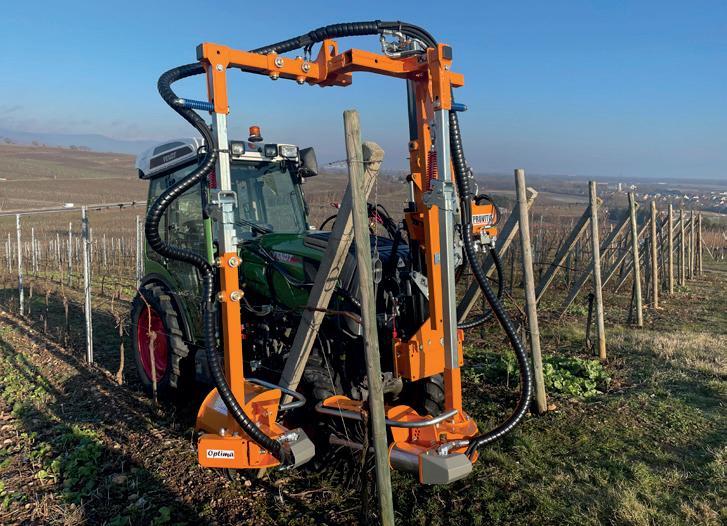

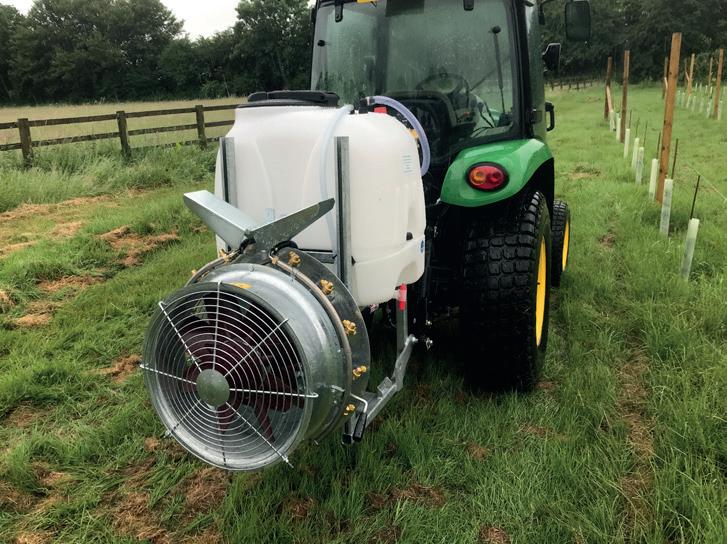
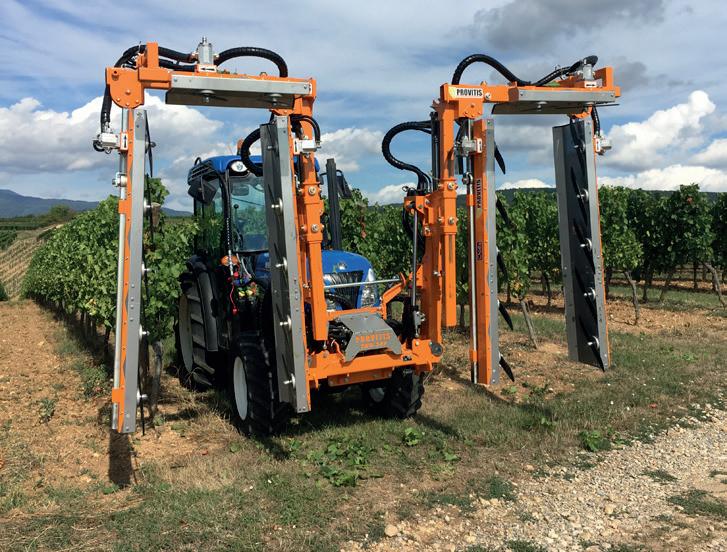

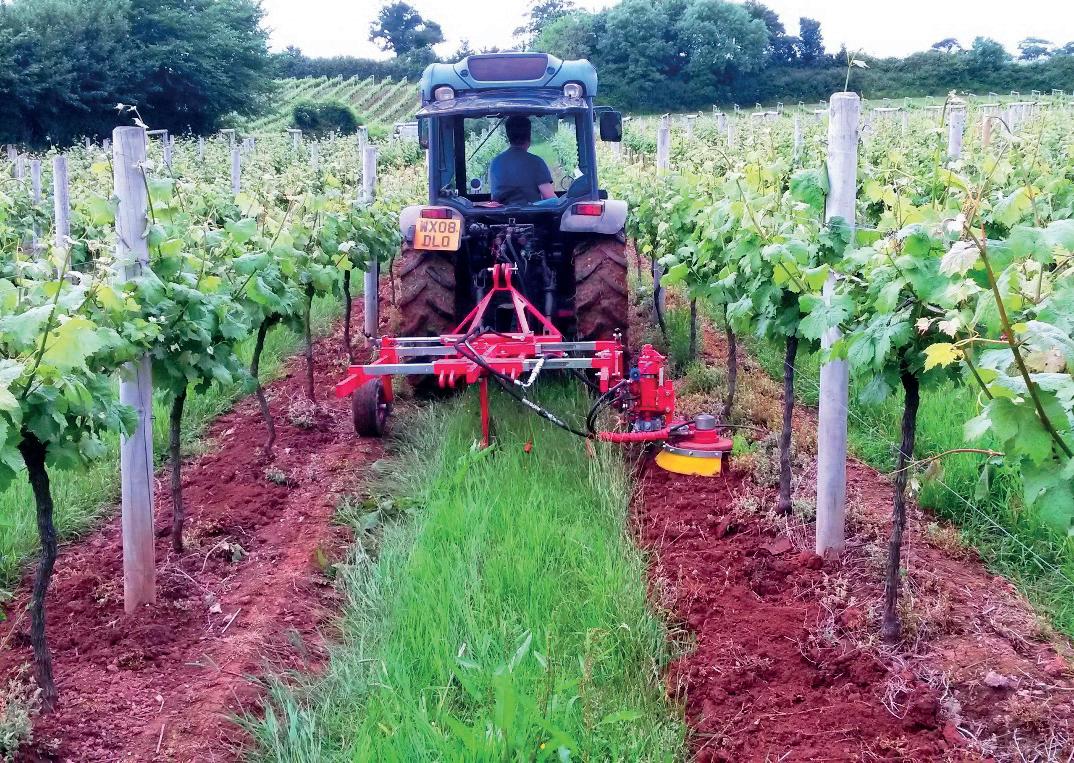









Kubota (UK) Ltd has introduced a narrow version of its 106hp M5-102 tractor, aimed at those working in specialist fruit, vineyard, vegetable and solar park applications.

This latest model is called the M5-102N, and it brings several upgrades over its predecessor, the M5001N. These include a revised cab complete with Category 4 filtration; front axle suspension and front pto; hydraulically adjustable rear linkage stabilisers and lift rods; and reduced cost of ownership through improved diesel particulate filter (DPF) and emissions control efficiency.
Power comes from Kubota’s V3800 engine. A 3.8 litre four cylinder turbocharged diesel, the V3800 delivers 346Nm of torque and 106hp, and is equipped with an EU Stage V compliant emissions package that uses diesel exhaust fluid (DEF).
Importantly, the emissions control module is neatly packaged under the bonnet, avoiding the need for external mounting of components such as the DEF tank and selective catalytic reduction (SCR) cannister, which could impact on the operator’s view from the cab. And with a diesel filler at the rear of the tractor and a DEF filler under the bonnet, it is almost impossible to mistake the fill points.
“Packaging is very important on a tractor that is governed by its physical size,” explains
Jonathan Rook, Kubota’s UK product manager for M-series tractors. “And this narrow model does not disappoint. Yet on its narrowest wheel and tyre combination, the M5-102N can be slimmed down to just 1.2m wide to suit row-specific tasks.”
Latest emissions control technology sees the M5N able to perform a DPF regen at much lower rpm and using much lower temperatures compared to the previous M5N. Requiring only 1,100rpm to complete, considerable fuel savings are available compared to the previous model’s 2,000rpm regen. A DPF service is not required until 6,000 hours, and engine oil changes are every 500 hours.
Power is channelled through a 36x36 transmission that uses six speeds in three ranges, with a two speed power split available in each of the six manual speeds. Electronic shuttle control and a declutch button add to the functionality, and the tractor’s 40kph road speed is achieved at reduced rpm.
Up front, a portal front axle with bevel gear incorporates Kubota’s switchable Bi-Speed turn, which increases the front wheel speed once the steering angle exceeds 35-degrees. When engaged, Bi-Speed turn tightens the turning circle by pulling the nose of the tractor in the direction of steering. The front axle can be equipped with an optional suspension system which provides 95mm of travel that
is damped by accumulators, and for the first time on this model, a factory-fitted front linkage and pto is also available.
M5-102N operators get a cab that provides an almost flat floor design, making the most of internal space and comfort, and also appealing to the tallest of operators. An uprated air-suspension seat is also part of the standard specification.
The dashboard combines an LCD panel with traditional gauges, and thanks to electronic engine control, operators can set two engine speed memories. With electronic engine speed monitoring and control, power demanding tasks can be better maintained without excessive fluctuations in engine speed.
Air conditioning is fitted as standard, while those who prefer fresh air can choose to open either of the two curved rear corner windows. Both front indicator assemblies are on spring loaded brackets, allowing them to be twisted inwards, 90-degrees, for added protection.
The tractor is now equipped with a stationary pto function, and LED lighting, and when it comes to hydraulic services, buyers have the choice of manual or electronic spools and the option of ISOBUS implement control through Kubota’s 7in or 12in K-Monitors.
Kubota’s M5-102N is priced from £58,868 and a range of Kubota Care warranty packages are available, offering up to five years and 5,000 hours of cover.

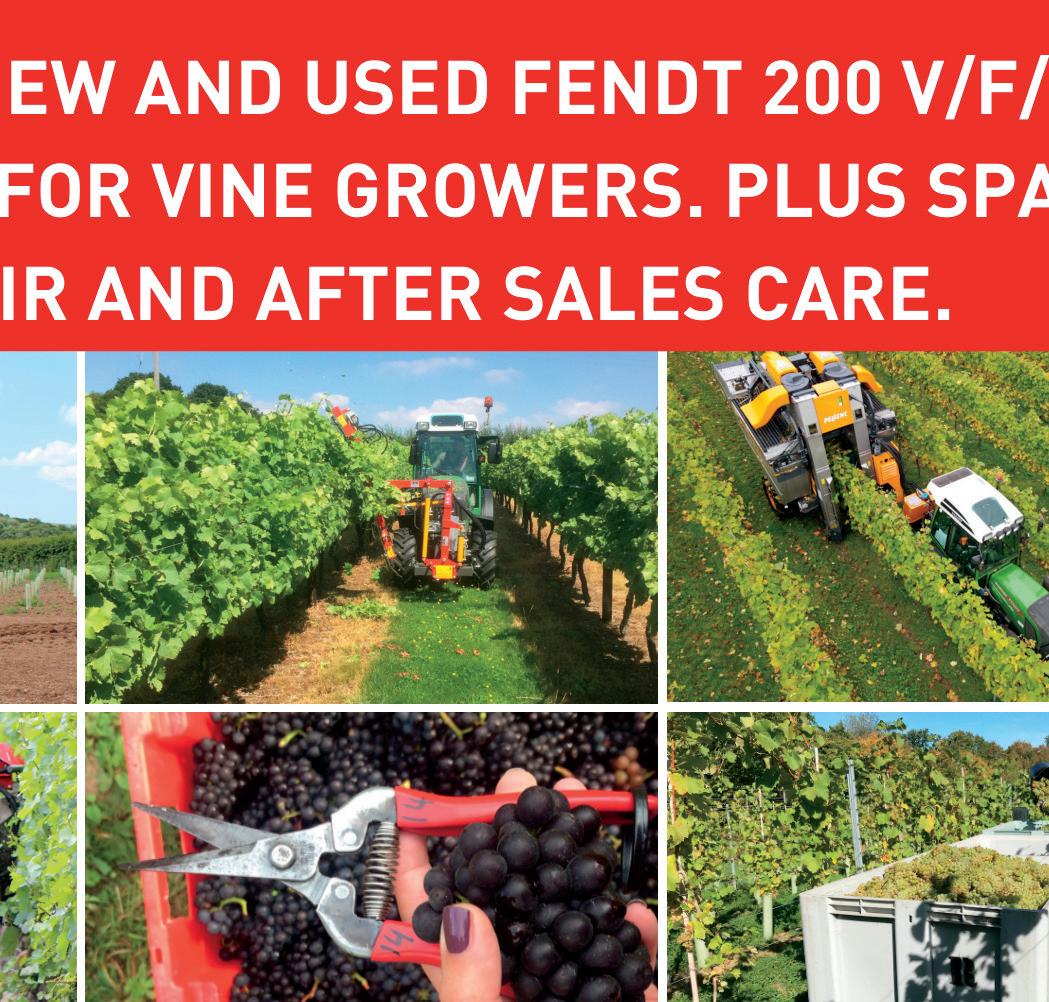










The Boisselet Filmatic strimmer works tirelessly around the vine trunks whether they are young or old or have tube protection or not. So long as the vine has a tutor next to it the machine's sensing wand commands the strimmer to work accurately around the trunk enabling it to be used around vines of any age including those newly planted.
Typical forward speed is 4kph to 5kph as was used in the pictures where two hectares were cleared in a day. The wand sensing system on the Boisselet is unique thanks to its Servo Motor and is capable of being adjusted for touch sensitivity against the vine trunk enabling a high work rate per day with
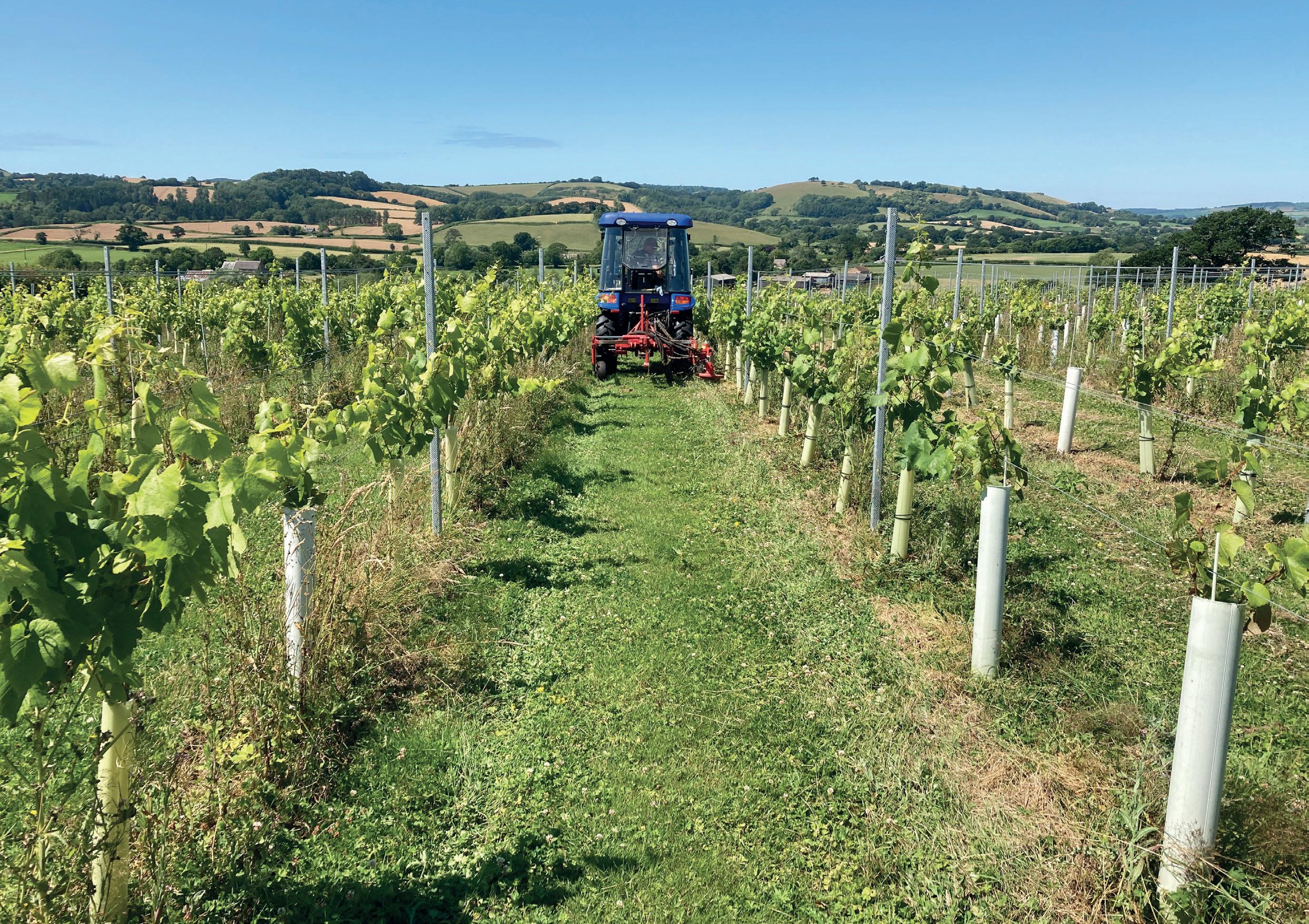

no damage to the trunk.
The strimmer cords are of a tough professional strength and are simply replaced by its push and pull action. The cords are pre cut to length with four on the head and it takes around 30 seconds to change them all.

The Filmatic works well if the grass or weeds are no higher than about 300mm but if there are tougher stronger mature plants such as nettles it is better to use the Boisselet Mini Rotofil.
As the Boisselet carrying frame is designed to be multi-functional it is possible to add on various inter vine cultivators thus making it extremely versatile and useful.



